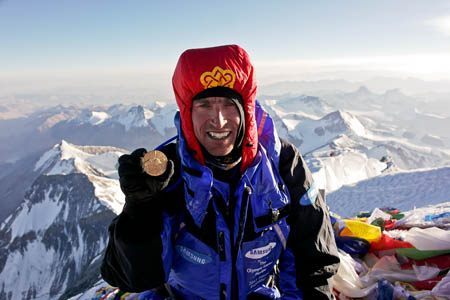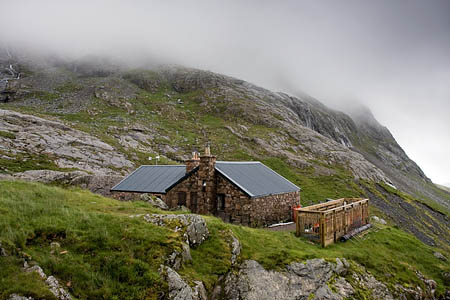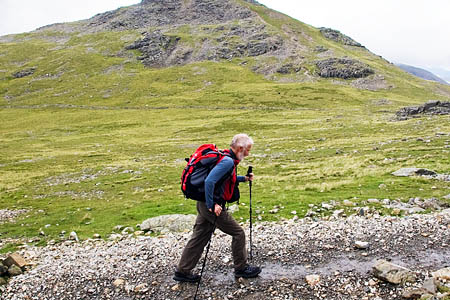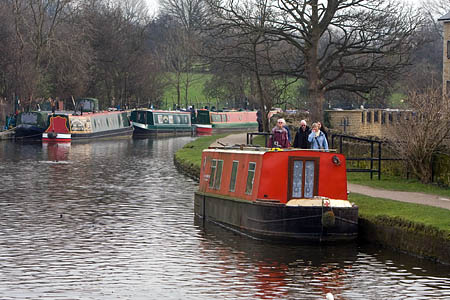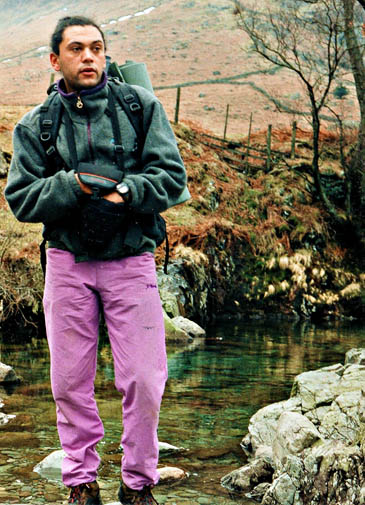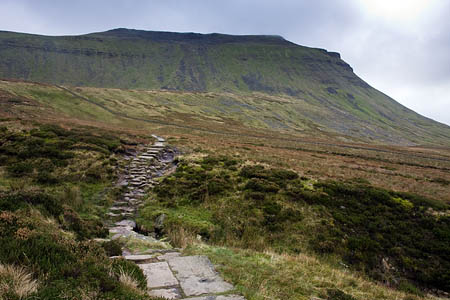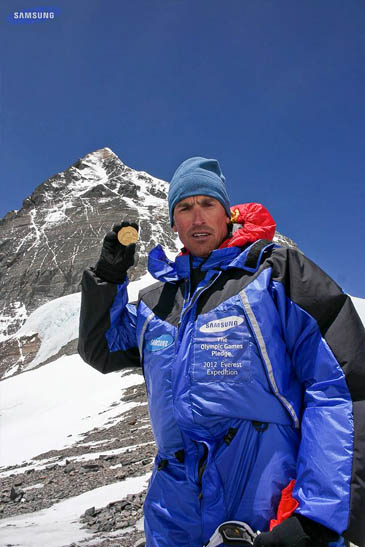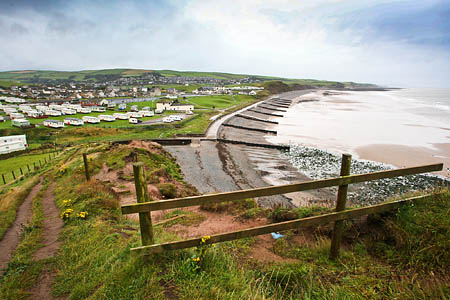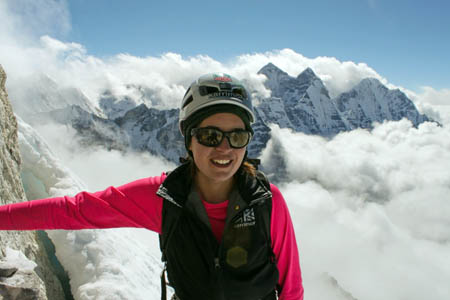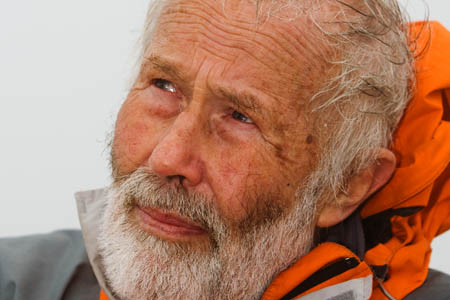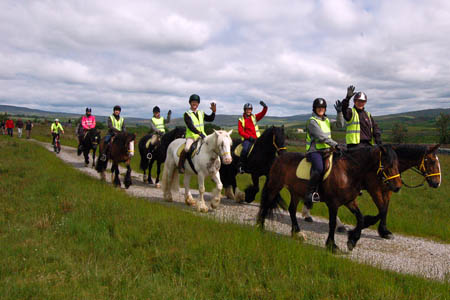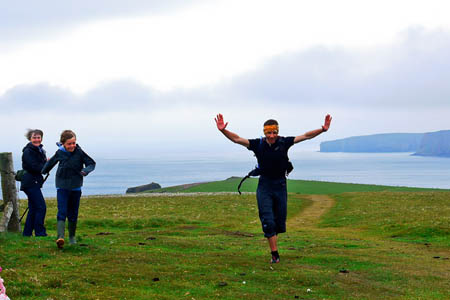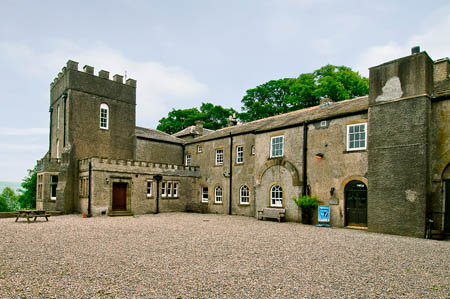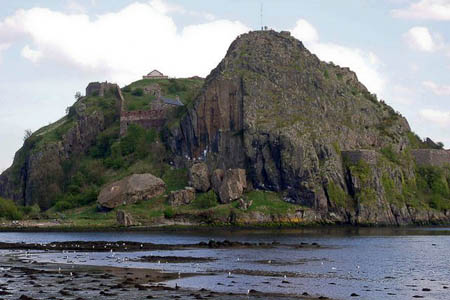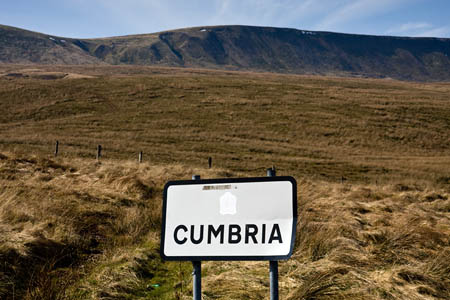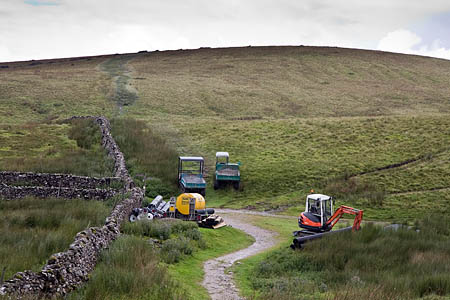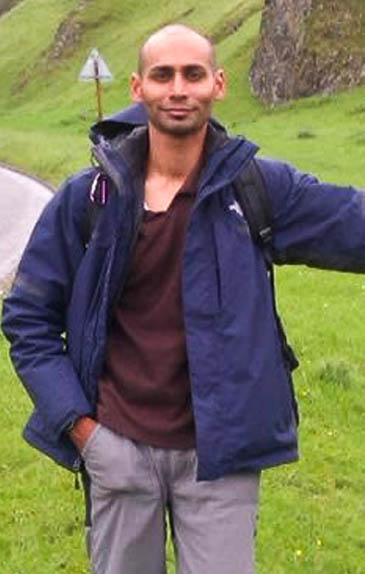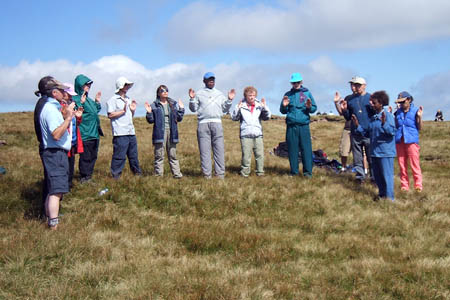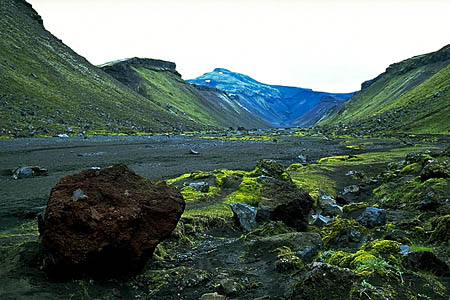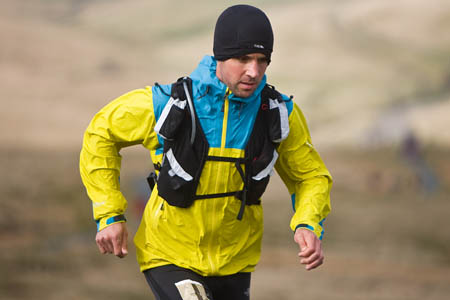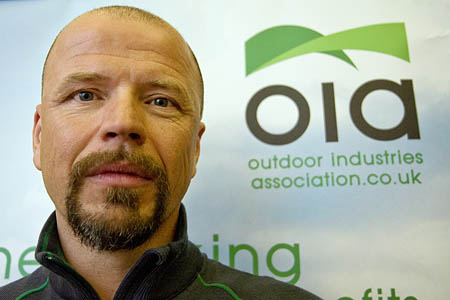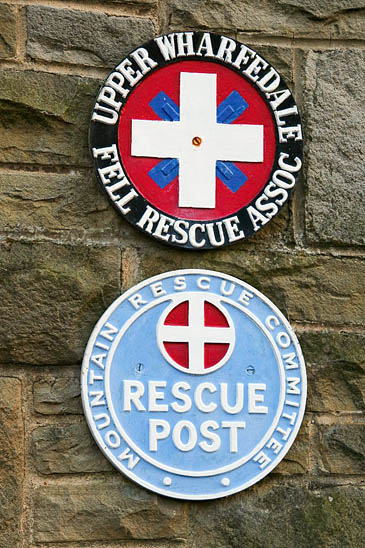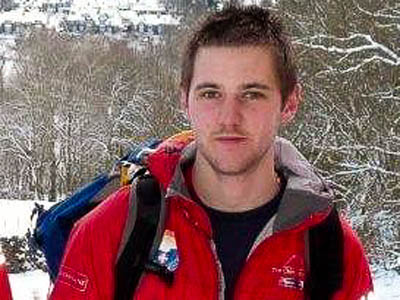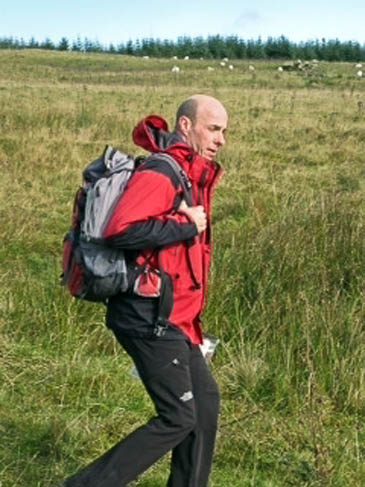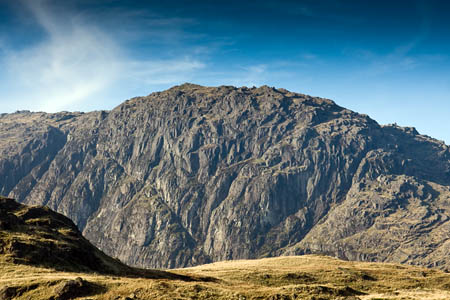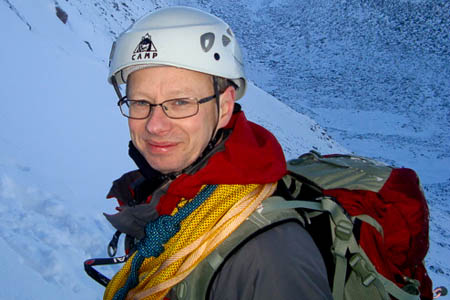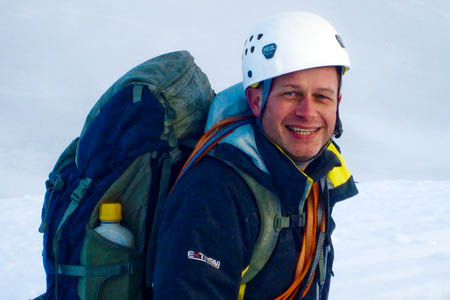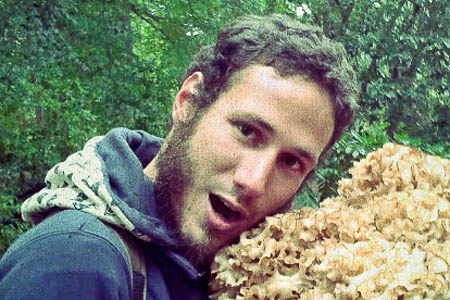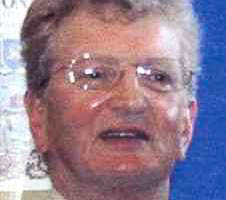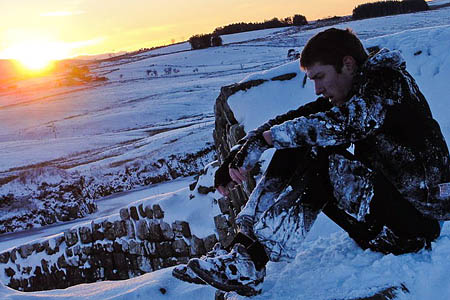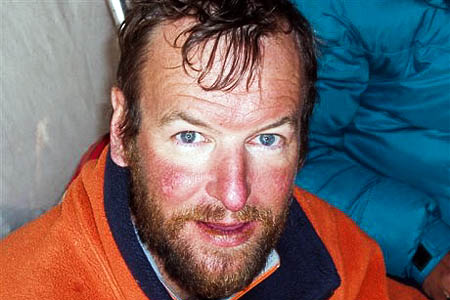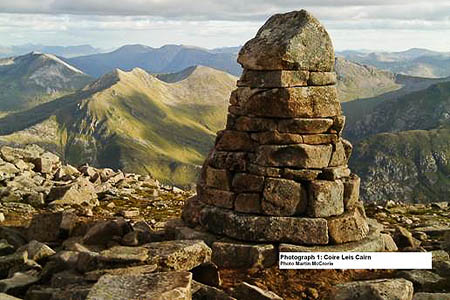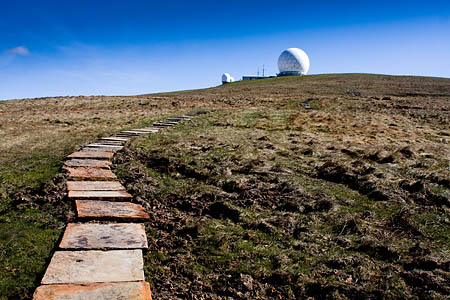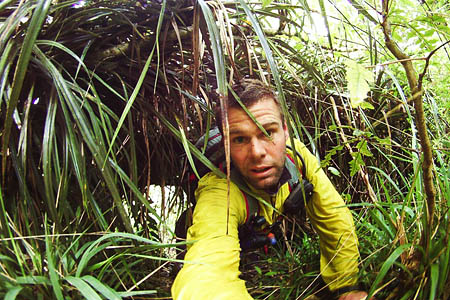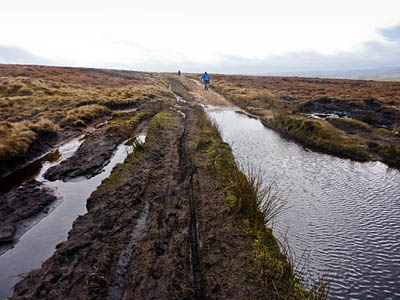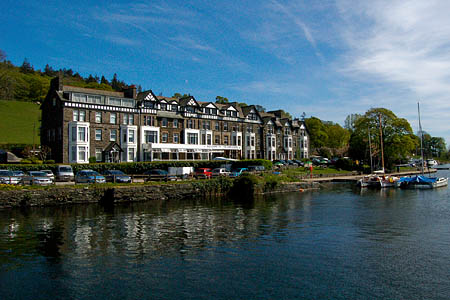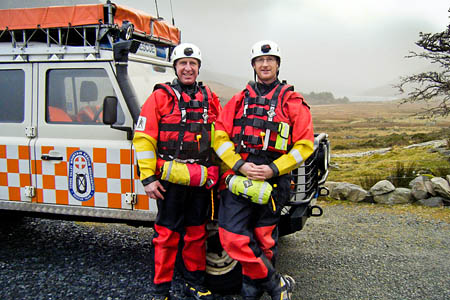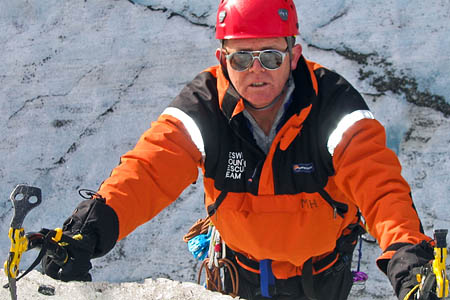Our rearward glance at a news-packed 2012 includes, as always, tragedy as well as uplifting stories of the great outdoors, and a few oddities.
In January, Loughborough University expert Professor Mike Gleeson said couch potatoes who take little exercise are likely to suffer more cold-like infections.
Professor Gleeson said moderate exercise such as a brisk daily walk enhances the action of the body’s natural killer cells, which help fight off viruses.
But he warned strenuous exercise such as fellrunning might increase the susceptibility to infections.
Television hardman and former footballer Vinny Jones had some New Year advice that could save lives.
In his light-hearted video he showed the rudiments of cardio-pulmonary resuscitation using a casualty ‘he prepared earlier’.
Ailing outdoor retailer Black Leisure announced it was going into administration.
The company, which operates the Millets and Blacks stores on Britain’s High Streets, said shareholders would receive nothing for their holdings, the sale of which was suspended.
Blacks Leisure employed 3,500 people in 208 Millets stores and 98 Blacks shops, and at its Northampton headquarters.
JD Sports subsequently snapped up Blacks’ assets in a cash deal worth £20m.
A mystery walker provided a challenge for rescuers in the Lake District. A major search involving five mountain rescue teams took place after he was reported missing.
Patterdale Mountain Rescue Team mounted a search after the man told the owners of a Penrith guesthouse, where he was staying, he was going for a walk on the Dodds on Wednesday.
Patterdale MRT leader Martin Cotterell said: “We hope the man is safe and well, but it would be good to know.”
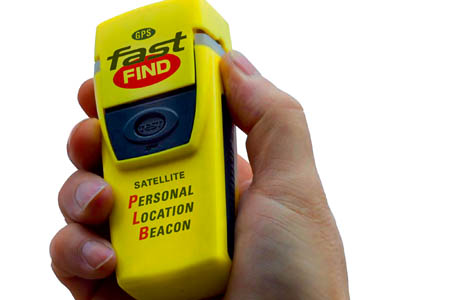
PLBs such as this one became legal to use on land in the UK
Outdoor enthusiasts were able for the first time to use personal locator beacons to send distress signals from the UK’s remote areas to an international satellite system.
New regulations came into force, allowing the use of PLBs on land in the UK.
A climbing hut under Ben Nevis’s north face reopened after repairs to the building needed when hurricane-force winds blew off part of the roof.
Work by volunteers put the Charles Inglis Clark memorial hut, known to mountaineers as the CIC hut, back in order and fully open.
Outdoor campaigners criticised councillors who planned to make a site visit to a controversial windfarm site – by going to a railway more than 10 miles away.
The John Muir Trust urged Highland Council members to pull on their boots and walk on the actual site of the proposed Allt Duine windfarm in the Monadhliath Mountains. The campaign against the development was still going strong 12 months later.
The sportscotland Avalanche Information Service, which posts daily information about snowpack conditions and avalanche risk, expanded its service with a free text forecast facility.
The company that makes the waterproof membrane in garments used by thousands of outdoor enthusiasts was named as one of the best companies to work for, according to an American magazine.
WL Gore & Associates, makers of Gore-Tex, featured at number 38 in Fortune’s top 100 companies.
The American magazine surveyed employees in firms in the USA, rating their company for job satisfaction, camaraderie and management credibility.
An event touted as Britain’s most brutal race was won by a pair of runners who completed the length of the Pennine Way in less than seven days.
Gary Morrison and Steve Thompson set foot in Kirk Yetholm 152hrs 2mins after leaving Edale to take the winners’ trophy in The Spine. Only three starters completed the course.
And a top British ultrarunner was crowned athlete of the year by an international body.
Lizzy Hawker was voted the top woman in the competition run by the International Association of Ultrarunners.
The Swiss-based four-times winner of the Ultra-Trail du Mont Blanc beat off opposition from 17 other top women ultrarunners to take the honours in the annual competition run by the association, which was formed in 1984 and represents member federations across the world.
Thousands of papers and other artefacts stored in Sir Chris Bonington’s Cumbrian garden shed were made available for the public to view after a lottery grant enabled the setting up of the archive.
A grant from the Heritage Lottery Fund enabled the Mountain Heritage Trust to catalogue and make accessible expedition documents, correspondence, press cuttings scrapbooks and manuscripts of the mountaineer’s books.
Lee Child, author of the Reacher novels, gave Brecon Mountain Rescue Team £10,000 towards their £60,000 target for a new control vehicle.
The Coventry-born, New York-based writer, whose real name is Jim Grant, has family connections with the team.
Aficionados of the late Alfred Wainwright passed on responsibility for a route following his first long-distance walk to a new group.
The Pennine Journey Supporters’ Club took over promotion and oversight of the route, from Settle in North Yorkshire and back again, along the eastern and western Pennines.
The route follows, with a few diversions, the paths taken by a young Wainwright just before the outbreak of the Second World Way, the account of which lay virtually unseen until A Pennine Journey was published almost 50 years after the trip.
In February, the Earl of Lindsay took on the role as head of the National Trust for Scotland, which owns some of the nation’s top mountain estates, including Glencoe and Ben Lawers.
He succeeded Richard, 10th Duke of Buccleuch if the trust’s membership endorses the move.
It was announced the canals of England and Wales and their towpaths would be hived off from British Waterways to a new charity in a £1bn deal.
Environment Minister Richard Benyon said the new Canal & River Trust will receive £1.26bn-worth of funding over the next 15 years.
The deal saw England and Wales’s 200-year-old network of canals and rivers pass from public ownership to a new body dubbed the ‘national trust for the waterways’.
A British company unveiled what it claimed was the solution to one of windpower’s major drawbacks: storage of surplus energy which can then be released during periods of calm.
Highview Power Storage uses liquid air storage which takes electricity at peak times and uses it to cool air until it liquefies at –196C.

Highview Power Storage's Slough liquid air plant
The company said the technology solves a major problem for windfarms: the need to turn off the turbines at peak wind times to avoid the power grid to be overloaded at times of lower demand.
Two walkers set fire to their map to attract attention from a police helicopter searching for them.
The man and woman were stuck in icy conditions on Kinder Scout in the Peak District and called for help.
The 26-year-old man and companion, 35, rang a friend to raise the alarm after they got stuck on an icy waterfall on Kinder Scout on Friday.
Two men were injured after an avalanche swept them 1,000ft down a mountainside.
The mountaineers, who were roped together, were caught in the avalanche on Stob Coire nan Lochan in Glencoe.
Eight Arrochar MRT members who were in the area and 21 volunteers from the Glencoe team took part in the rescue.
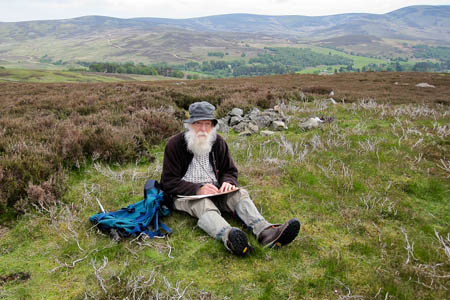
Dr Watson. Photo: Derek Pyper/Adam Watson Collection
Dr Adam Watson, dubbed Mr Cairngorms, received the year’s Scottish Award for Excellence in Mountain Culture.
The award is made annually at the Fort William Mountain Festival.
Organisers described 81-year-old Dr Watson as a biologist, ecologist, mountaineer, author and defender of the environment. The award is made to individuals who have made an outstanding contribution to Scotland’s mountains.
National park bosses gave the go-ahead for Scotland’s only working gold mine after cash pledges from the developers.
The Australian owners of the mine in Strathfillan in the southern Highlands said they would press ahead with the £80m project this summer.
The controversial Cononish mine lies in the shadow of munro Ben Lui in the Loch Lomond and the Trossachs national park.
Nigel Keer of Leeds was fined for walking in just his boots and a cap at a West Yorkshire beauty spot.
The 41-year-old was arrested by an off-duty police officer who spotted him at Otley Chevin.
PC Mark Buxton said a woman dog walker who passed him while he was out running had a ‘disgusted frown’ on her face.
The Ramblers condemned the decision by a local authority to sell off parts of an area of outstanding natural beauty despite a 35,000-name petition against the move.
Somerset County Council confirmed the sale of 800ha (2,000 acres) of land in the Quantock Hills despite widespread local opposition.
The Ramblers said they were deeply concerned at the sale, and claimed the authority had not carried out an economic or recreational valuation of the land, which includes Thorncombe Hill, Great Wood and Customs Common.
A climbing instructor who introduces town-dwelling young people to the outdoors vowed to continue his work after his gear was destroyed in an arson attack.
Sam Farmer said the incident last month was the latest in a series of racist attacks he has had to endure since moving to Cornwall 12 years ago.
The 47-year-old, who was born in Liverpool, runs the Hope Project at St Agnes, a surfers’ paradise on the north Cornwall coast.
Scotland’s mountain rescue umbrella organisation appointed an experienced outdoor instructor with a brief to improve communications and service during a period of expected increase in demand from walkers and climbers.
Shaun Roberts took up the post of project manager for a year with the Mountain Rescue Committee of Scotland.
His role was to support for voluntary teams that operate north of the border in mountain and cave rescue, during a period when the Scottish Government moved towards a single police service for the nation.
Two brands were caught up in a controversy over the goose down in their products.
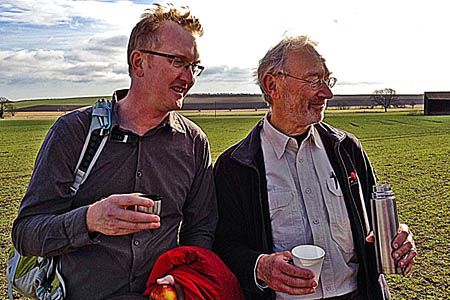
Benedict Southworth, left, joins member David Smith on the walk
Both Patagonia and The North Face said they are aware of the issue and were working on a long-term solution, but international animal-rights organisation Four Paws called on Patagonia, which is at the forefront of ethical business practices, to label its products that do contain down from force-fed geese and to stop using the down.
The recently appointed boss of Britain’s biggest walkers’ charity joined a group of members in a walk for the first time.
Benedict Southworth, chief executive of the Ramblers, pulled on his boots on for an 8km (5-mile) walk in the Hertfordshire countryside in the company of more than 30 walkers from across the county.
A retired national park stalwart and long-time rescue team member received his MBE from the Queen.
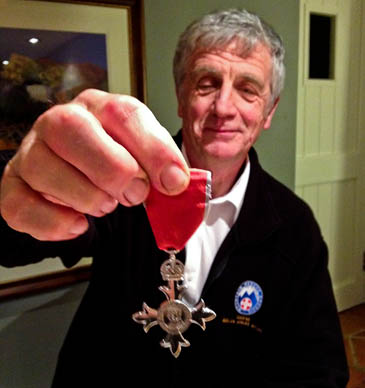
Rae Londsale with his medal
Rae Lonsdale of Settle in North Yorkshire said he had to put up with good-humoured ribbing but also received compliments from friends and colleagues after his appointment.
The 64-year-old is a member of the Cave Rescue Organisation, which goes to the aid of both potholers and fellwalkers in the Yorkshire Dales, and retired last year from the national park authority.
Highlands and Islands Enterprise announced Scotland’s busiest ski resort could be put up for sale.
The CairnGorm Mountain snowsports centre, along with its controversial funicular railway, is owned by the agency which said it was exploring a potential sale.
The development agency built the funicular, which runs up the north side of Britain’s sixth highest mountain, and the ski lifts, restaurant and other facilities at the snowsports centre.
Following protracted financial problems, HIE took over the operator of the ski resort, CairnGorm Mountain Limited, in 2008.
A councillor from the city which lost four teenagers in a kayaking tragedy started an e-petition calling on the Government to halt the proposed abolition of statutory licensing for adventure activities.
The coalition Government was planning to dismantle the Adventure Activities Licensing Authority and move to a voluntary code of practice for those running outdoor activities for young people.
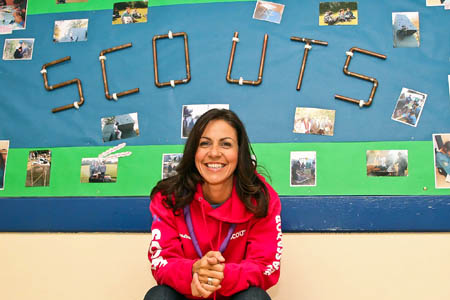
Julia Bradbury became a Scout ambassador
But Plymouth City Council member Nicky Williams called on the Department for Work and Pensions to stop the move.
The plan was subsequently suspended when the Welsh and Scottish Governments said they would not be ditching statutory regulation.
Walking celebrity Julia Bradbury became an ambassador for Britain’s Scouts.
She joined a roll-call of inspiring public figures who use their status to promote and increase awareness of Scouting, which has 508,000 members in the UK. The movement would, towards the end of the year, announce a consultation on allowing atheists to join.
A former national park learning centre announced it would reopen as a youth hostel after a £2m refurbishment.
Losehill Hall near Castleton in Derbyshire was sold off by the Peak District National Park Authority as part of its response to 28 per cent budget cuts by the coalition Government.
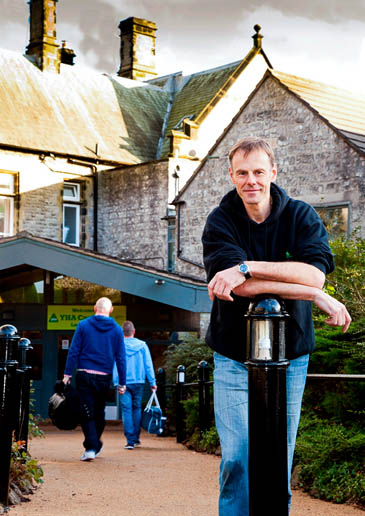
Manager Alistair Boyd at Losehill Hall
YHA, which took over the hall, pledged it would continue to provide educational provision at the grade II-listed Gothic Victorian mansion.
The budget accommodation charity said it had transformed the building into an environmental learning, residential and activity centre for young people and holiday-makers.
In March authorities in Svalbard said no-one would be prosecuted over the death of a 17-year-old Eton College student who was attacked by a polar bear the previous year.
Horatio Chapple was with a group from the British Schools Exploring Society on the Von Postbreen glacier on Spitsbergen, the largest island in the Norwegian Arctic archipelago.
A police investigation carried out under the control of the Governor of Svalbard found that no criminal offence had taken place.
The head of the National Trust announced she was stepping down from her post.
Dame Fiona Reynolds said she would miss working for charity but was proud of what the trust has achieved in the 11 years she headed the organisation.
The National Trust was at the forefront of opposing coalition Government plans to change planning laws in England.
Dame Fiona will take up the post of Master of Emmanuel College, Cambridge next year, the first woman master in the college’s history.
One of Britain’s top climbers followed in the footsteps of Sir Arthur Conan’s Doyle’s adventure heroes with ascent to a South American ‘lost world’.
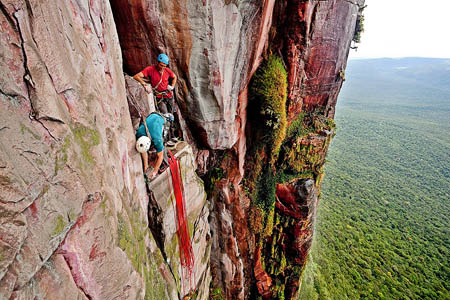
Leo Houlding on the Cerro Autana climb. Photo: Alastair Lee
Leo Houlding’s climb of the Cerro Autana, the 1,400m table mountain which towers above the Venezuelan rainforest was filmed by cinematographer Alistair Lee for a movie released later in the year.
The trade body representing outdoors companies moved its headquarters to the Lake District.
The Outdoor Industries Association was based at Ratho, Edinburgh.
Communications director and former chief executive Louise Ramsay and administration manager Catriona Rice, took redundancy when the move was announced.
A couple who got lost while coming down England’s highest mountain were faced with a taxi bill of £110 to get themselves back to their base.
The pair, from Scotland, called for help when they got lost while descending Scafell Pike.
Mike Gullen of the Wasdale Mountain Rescue Team said: “We mounted a limited call and two team members walked up to Sty Head and walked them back to Wasdale.
“We arranged a taxi for the pair to take them back to Langdale which cost them £110!”
A man was rescued from an antipodean wilderness, thanks to coastguards in Cornwall, 11,000 miles away.
Chris Painter activated his personal locator beacon when he injured his knee on a 10-day trip in the Kahurangi national park in New Zealand.
The retired teacher’s SOS signal was picked up by the Maritime and Coastguard Agency in Falmouth, and staff there alerted the New Zealand rescue services, who went to the expat’s aid.
A party of 17 walkers was rescued after getting lost in the dark on Yorkshire’s second-highest peak.
The walkers, a mixed male and female group aged between 16 and 24, were attempting the Yorkshire Three Peaks, a 39km (24-mile) challenge walk taking in Pen-y-ghent, Whernside and Ingleborough.
The group called for help after taking the wrong route off Ingleborough.
A veteran of numerous rescues stepped down as leader of a Lakeland mountain team.
Ian Clemmett left the Penrith Mountain Rescue Team after 16 years’ service with the volunteer rescuers, three as team leader.
He left the area because of a change of job. His place as team leader was taken by Mike Hill, who has been with the team for eight years.
Campaigners said that coalition Government plans to cut red tape would threaten mediaeval green spaces.
The Open Spaces Society expressed its concern that proposals by the Department for the Environment, Food and Rural Affairs to relax rules on common land mean more development could take place.
Record-breaking Everest summiteer Kenton Cool announced plans to try to honour a promise made to the father of the modern Olympics.
Cool, who has reached the top of the world’s highest mountain more than any other Briton said he would attempt to carry a rare Olympic medal to the summit of the 8,848m (29,029ft) peak.
Gold medals were awarded by Baron Pierre de Coubertin at the 1924 Winter Olympics in Chamonix to a representative of the 1922 expedition that came within 600m of the summit before being forced to turn back.
He would go on to reach the summit with the Olympic medal presented to Arthur Wakefield for his part in the unsuccessful 1922 summit attempt.
A cash shortage forced a charity that helps manage Britain’s highest mountain to suspend its operations.
The Nevis Partnership, which has responsibility for co-ordinating environmental and visitor management on and around Ben Nevis, said it was pinning its hopes on a lottery fund application which would enable it to restart its work.
But managers at the partnership, which was formed in 2003, expressed their disappointment at the forced decision to cease its work after a failed attempt to attract funds 18 months ago.
National park bosses warned outdoor enthusiasts of the danger of moorland fires after a prolonged spell of unseasonably warm and dry weather.
Signs were put up in the Peak District to warn walkers, climbers and mountain bikers to be on the lookout for wildfires.
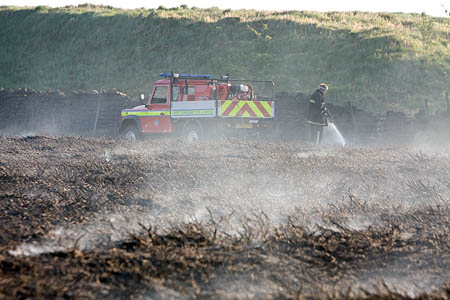
National park rangers warned of the danger of moorland fires
Rangers from the Peak District National Park Authority mounted extra patrols and erected warning signs in the area.
They said lack of rain in recent weeks had dried out the moors making them especially vulnerable to fires which harm wildlife, destroy rare plants and cause erosion, taking years to regenerate.
In April mountain rescue team member had to be airlifted to hospital after he slipped and injured his ankle after helping rescue two climbers who were stuck.
The man, a member of the RAF Valley Mountain Rescue Team, was part of a rescue party that went to the aid of the climbers on Tryfan’s East Face.
The RAF Valley team responded along with 15 members of the Ogwen Valley Mountain Rescue Organisation after the pair called for help.
The unseasonably warm weather ended, to be replaced with snow in parts of Britain.
Mountain rescue teams helped stranded motorists and dealt with emergencies caused by heavy snow in the Peak District.
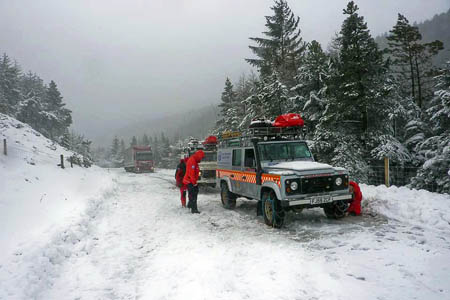
The Edale team in action on the Snake Pass. Photo: Dave Torr/Andy Cass/Edale MRT
Edale Mountain Rescue Team was called out by Derbyshire Police after drivers and occupants of vehicles on the A57 Snake Pass got stuck in the snow.
The road, from Sheffield to Glossop, runs between the national park’s two highest peaks, Kinder Scout and Bleaklow.
And nine walkers were airlifted from Britain’s second highest mountain after getting caught out in heavy snow.
The nine, including six teenagers, called a friend for help from Ben MacDui.
Braemar Mountain Rescue Team was alerted to the plight of the walkers, who were reported stuck on the 1,309m (4,295ft) mountain in the southern Cairngorms.
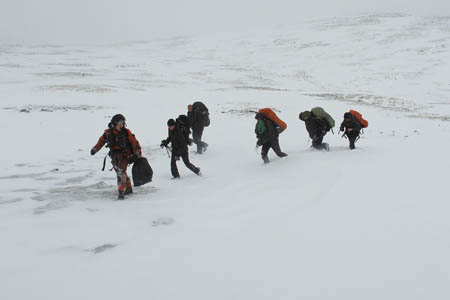
Petty Officer Mike Henson leads the walkers to safety. Photo: MoD/Crown Copyright
A Royal Navy Sea King helicopter from HMS Gannet in Ayrshire flew to the walkers’ rescue and plucked four of the party from Derry Cairngorm and took them to Braemar before returning to the mountainside to airlift the remaining five people.
Cumbria’s top cop said he would scale a Lakeland peak as part of an event commemorating a Surrey police officer who was killed.
Chief Constable Stuart Hyde and other officers from Cumbria Constabulary joined the Light the Lakes event, which set out to light a lamp on every one of the 214 Wainwright fells later this month.
The event, organised by Sergeant Ian Davis, chair of the Surrey Police Federation, was to raise cash for the family of Detective Constable Heather Cooper, the 33-year-old whose body was found in Blackdown Woods, West Sussex. She had been beaten about the head and stabbed in the throat.
The acquisition of failed outdoors retailer Blacks Leisure dented profits for its new owners.
The Blacks section of JD Sports lost £2.2m in the three weeks between it being bought and the company’s year-end.
The loss came despite revenues of £5.9m, but JD Sports said: “The Blacks business was in a very fractured state on acquisition.”
The new president of the Ramblers said the spirit of the Kinder Scout Mass Trespassers must be kept alive in the face of mounting challenges to the right to access the countryside.
Veteran campaigner Kate Ashbrook, who was elected to the Ramblers’ post, said: “We must keep the Kinder trespassers’ torch aflame.”
Addressing a Peak District gathering to mark the 80th anniversary of the battle fought between ramblers and gamekeepers on the area’s highest hill, Ms Ashbrook said: “We cannot be complacent; we cannot treat Kinder as mere history.
“The threats which the trespassers fought are still very much with us, but in a different guise.”
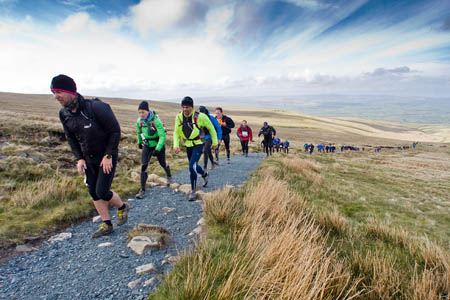
Fellsman entrants make their way up Ingleborough before the event was abandoned
A challenge event had to be abandoned in the middle of the night after persistent bitter winds led to many of the competitors suffering hypothermia.
The Fellsman, a 97km (60-mile) event through the Yorkshire Dales, was stopped at 1.43am with runners and walkers barely able to see and many having dropped out on the event’s 50th running.
Ultrarunner Jez Bragg had already crossed the line, albeit in a time one hour slower than his best, to take his third victory in the race.
Mike Park of the Cockermouth Mountain Rescue Team praised the actions of a consultant cardiologist and other medical staff who came across a walker on Dale Head who was in difficulties.
The mountain rescuer said the group carried out cardio-pulmonary massage on the man for 40 minutes until a helicopter carrying a defibrillator arrived.
He said the medics had probably saved the walker’s life and likened the incident to that involving footballer Fabrice Muamba.
Mr Park urged members of the public to learn CPR techniques.
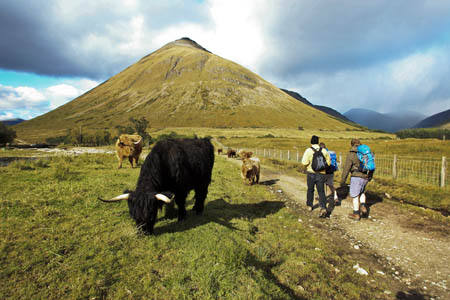
Fewer Scots were taking to the outdoors
Fewer Scots were heading for the outdoors, a survey revealed.
Scottish Natural Heritage said 2 per cent fewer people took a trip to the countryside for leisure and recreation the previous year compared to 2010.
But the Scottish Government’s advisory body on the outdoors said the overall trend of outdoor activity was holding steady, despite the dip last year.
In 2011, 46 per cent of adults who live in Scotland made at least one visit per week for outdoor recreation.
SNH said: “Walking is the most popular outdoor recreational activity among adults living in Scotland.”
In May, Lake District planners approved an extension to England’s controversial first via ferrata.
The decision meant Honister Slate Mine was able to offer what it dubbed its Via Ferrata Xtreme at the site on crags below the summit of Fleetwith Pike in the Lake District.
The mine’s owners were faced with a bill of £28,000 after a successful prosecution over damage to a site of special scientific interest by an extension to the facilities and visitors using it.

Hundreds of walkers celebrated the opening of the Wales Coast Path. Photo: David Bateman
Hundreds of walkers pulled on their boots to celebrate the opening of the world’s longest coastal path round a whole nation.
The Wales Coast Path offers 1,400km (870 miles) of walking from the Dee estuary in the North to Chepstow in the South.
Ramblers Cymru lined up more than 100 coastal walks to celebrate the path’s official opening over the Mayday bank holiday weekend.
A long-distance athlete announced his plans to run across the Alps in a 1,000-mile challenge to raise cash for charity.
Stuart Walker said he would tackle the route from Vienna to Nice in 30 days.
The 26-year-old ran solo on his Big Alps Run, carrying a small tent, food and all his equipment, camping most nights.
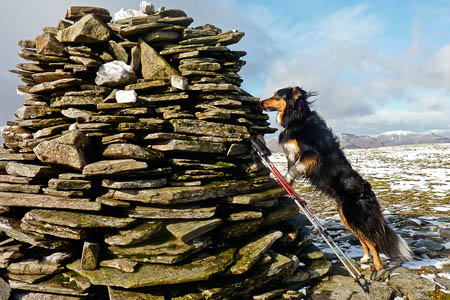
Molly the Collie celebrated her feat
It was announced Molly the Collie planned to complete an impressive round of 220 Scottish peaks.
Five-year-old Molly needed to summit the 885m (2,904ft) Ardgour mountain Garbh Bheinn to tick off her final corbett with a group of friends.
Her owner Anne Butler promised a celebration meal of sausages, replacing the traditional champagne for ‘completers’ of the list.
Less well known than Scotland’s 3,000ft munros, the corbetts are the hills between 2,500ft and 2,999ft. Molly followed in the pawprints of Kitchy, another collie, which was the first recorded munro completer.
Kitchy and his owner Hamish Brown ticked off their last munro in the 1960s.
The coalition Government kicked off plans to bring localism to England’s national trails.
Natural England began an eight-week consultation on its proposals to put the care of the 13 long-distance recreation routes, into the hands of trail partnerships set up to manage each of the routes, which includes the country’s first official long-distance path, the Pennine Way.
Natural England’s proposed changes reflected coalition Government policy on handing over decision making to local bodies and away from central control.
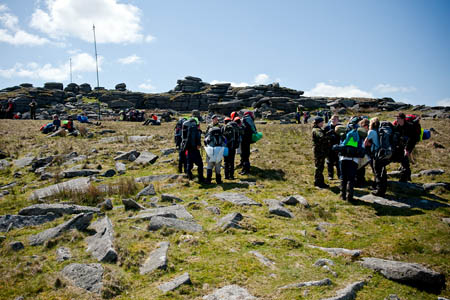
Ten Tors participants on the event. Photo: Adrian Harlen/MoD/Crown Copyright
Almost 2,000 teenagers managed to complete a tough two-day challenge over Dartmoor.
Organisers of the Ten Tors challenge said 251 of the 2,400 starters had to drop out because of minor sprains and strains.
The Army organised event took place in sunny weather and saw teams tackle routes of 35, 45 or 55 miles navigating across the moor from a start at Okehampton Army Camp.
Access campaigners welcomed coalition Government moves to speed up the process of registering ‘lost’ footpaths and other rights of way.
The Open Spaces Society said Department for the Environment, Food and Rural Affairs proposals would make it easier to bring England’s official maps up to date.
The society, Britain’s oldest national conservation body, said the state of the country’s present definitive maps was lamentable.
A walker was rescued after injuring himself less than a mile after starting a 192-mile trek.
The man suffered an ankle injury on St Bees Head shortly after starting the Coast to Coast Walk.
Members of Wasdale Mountain Rescue Team were called out when the walker was unable to continue on his long-distance trek.
Mountain rescuers announced plans to join the Queen’s diamond jubilee celebrations by lighting a beacon – on the Brecon Beacons.
Bridgend-based Western Beacons Mountain Search and Rescue Team will lit the fire on Fan Gyhirych as one of more than 2,000 across the UK to mark the monarch’s 60 years on the throne.
The fire, one of about 100 across Wales, was built and lit by the volunteer team on the evening of Monday, 4 June.
Bosses at a new indoor climbing centre expressed their determination to open on time despite thieves stripping the roof of its lead.
The Kilnworx Climbing Centre in Burslem, Stoke-on-Trent, was raided for its valuable metal.
The venue, Wycliffe Hall, which stood on the site for 130 years, had been empty for the last 15 years, but director Lionel Bunting said its planned opening is a culmination of hard work from various groups which has seen a disused building totally transformed ready for the community to enjoy once again.
An Everest summiteer offered her congratulations to the woman who broke her record as the youngest female Briton to get to the top of the world’s highest mountain.
Bonita Norris, who became the youngest British woman at the age of 22 to summit the mountain, lost her title to Becky Bellworthy, 20.
But the record was short-lived, as 24 hours later 19-year-old Briton Leanna Shuttleworth made it to the summit of Everest.
Britain’s biggest bird conservation charity condemned the coalition Government’s plans to trap buzzards and destroy their nests.
The Royal Society for the Protection of Birds said the move, by minister Richard Benyon, was in response to lobbying from the pheasant shooting industry, which maintains its young birds are being killed by the raptors.
The RSPB said it was stunned by the plans which would set a terrible precedent and prove to be a costly and unnecessary exercise.
The proposals were part of a £375,000 study on the effects of the birds of prey on commercial game birds.
The Department for the Environment, Food and Rural said it had ‘no plans to cull buzzards’.
A week later, Minister Richard Benyon performed a u-turn, saying: “In the light of the public concerns expressed in recent days, I have decided to look at developing new research proposals on buzzards.”
MP Tim Farron asked Chancellor George Osborne to use Network Rail’s £4m fine for the Grayrigg train crash for health and safety breaches to help the volunteer rescue teams, many of which helped emergency services following the fatal accident.
Mr Farron, who is the Liberal Democrats’ national president, said the equivalent amount of the fine should be paid to mountain rescue from the consolidated fund, the Government’s central ‘bank account’.
Chief Secretary to the Treasury Danny Alexander said ‘no’.
Sir Chris Bonington took the Olympic torch to the summit of Wales’s highest peak – by train.
Sir Chris, veteran of Everest and scores of other major mountaineering achievements chose to make the ascent of Snowdon from Llanberis on the Snowdon Mountain Railway.
Accompanied by London Organising Committee of the Olympic Games minders, PR people and media representatives, the elder statesman of British Mountaineering left the train and carried the torch up the last few metres from the Hafod Eryri building to hoist it aloft on the 1,085m (3,560ft) summit.
The flame made the journey up the Snowdon Mountain Railway in a miner’s Davy lamp.
A team of ‘Vangonauts’ was launched into the sky above the Scottish Highlands.
A space tent containing four mini astronauts reached an altitude three-and-a-half times the height of Everest before returning to earth after its helium-filled latex balloon popped in the low pressure of the stratosphere, 31,500m above the Scottish hills.
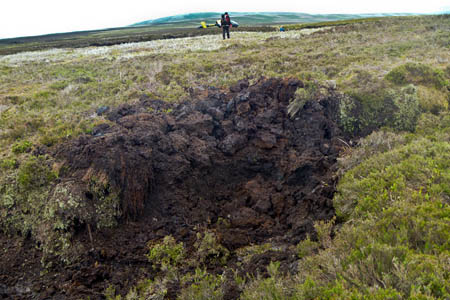
The crater left after the controlled explosion near the Cut Gate path
In June a mountain rescue team warned outdoor enthusiasts about the dangers of unexploded shells near a popular Peak District path.
Woodhead Mountain Rescue Team was called after a member of the public found the bomb near the Cut Gate path, which runs from Langsett to Slippery Stones at the head of the Upper Derwent Valley.
Members of a bomb-disposal squad destroyed the shell in a controlled explosion that left a huge crater.
Prince William qualified as a captain for search and rescue helicopters in the Royal Air Force.
The Duke of Cambridge, who is patron of Mountain Rescue England and Wales, took charge of flying missions, including those to rescue stricken walkers and climbers in Britain.
The prince, who has been a qualified search and rescue Sea King pilot for almost two years, passed a two-day test and qualified as a captain at the end of May.
England’s third-longest national trail was officially opened by actor Martin Clunes.
The television star cut a ribbon at Far Moor Bridge near Selside in the Yorkshire Dales to mark the opening of the Pennine Bridleway.
The 330km (205-mile) route runs from Middleton Top in Derbyshire to Street, near Ravenstonedale in Cumbria, and has been specifically designed for horse riders, but is also tailored to mountain bikers and walkers.
A trial began on Wales’s highest mountain to help disoriented walkers and hopefully lead to fewer calls for help.
Small plaques bearing grid references were fixed to stiles and gates on Snowdon in an attempt to promote mountain safety.
The Mountainsafe Partnership, which came up with the idea, hoped it will encourage walkers and other outdoor enthusiasts to use their maps and compasses and will help them work out where they are.
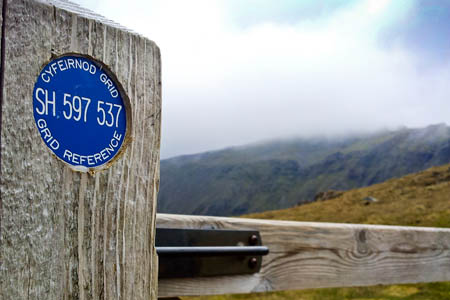
One of the grid-reference plaques. Photo: Snowdonia NPA
The small discs, which bear the initial letters plus a six-figure grid reference, were obviously not to everybody’s liking: one set was defaced and damaged later in the year.
A bridge on the main access route into a popular Highland walking and climbing would close for repair work, owners said.
Outdoor enthusiasts heading for Glencoe’s Lost Valley and Geàrr Aonach would not be able to use the bridge leading directly to Coire Gabhail while the National Trust for Scotland carries out maintenance work.
The repairs were expected to take eight weeks but in the end took almost twice as long, necessitating detours for walkers and climbers.
Unique notes by Lakeland author Alfred Wainwright went on show to the public after aficionados of the late guidebook creator helped secure them in an auction.
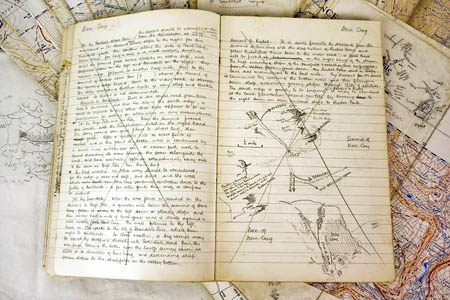
Wainwright artefacts went on display after the auction. Photo: HH Auction Rooms
The Wainwright Society and a group of private sponsors were successful in the Carlisle auction.
The papers, along with annotated Ordnance Survey maps, are now housed at the Cumbria Archive Centre in Kendal, Wainwright’s adopted town.
An ultrarunner completed a remarkable 30-day run along Scotland’s watershed.
Colin Meek completed the 600-mile (966km) route, which began on the English border, with his arrival at Duncansby Head on the north coast.
En route, he summited more than 30 munros and made 33,000m (108,250ft) of ascent.
The Dundonnell-based runner rested for just three days during the 30-day trip and clocked up nine ultramarathons on the journey – runs of greater length than a standard marathon.
The continuing shame of persecution of birds of prey in Scotland was marked when police appealed for the public’s help after a golden eagle was poisoned on the west coast of Scotland.
The bird’s body was found in March near Morar, south of Mallaig, and tests established the cause of death as banned pesticides.
The eagle had been bred in a habitat management area created by Scottish Power Renewables beside Beinn an Tuirc windfarm on the Kintyre peninsula and was fitted with a satellite tracking device in 2010.
A refurbished youth hostel reopened to the public boasting a honeymoon suite.
Grinton Lodge in Swaledale also had extra rooms, en-suite accommodation and better facilities for those using the camping pods in the grounds of the former shooting lodge.
The hostel’s owners YHA said it hoped to boost visitor numbers by 60 per cent, helping the local economy. Two new jobs were created following the £647,000 upgrade to the building, which included reopening a formerly disused wing.
In July, local residents backed plans for a new long-distance trail linked to the West Highland Way.
The route, tentatively dubbed the Way to the Isles, would run from Tyndrum to Oban, with potential for a future extension to Mull and Iona.
Government advisory body Scottish Natural Heritage estimates 3,000 people could walk the whole 72km (45-mile) route annually, with a total of 32,000 also using it for day trips, dog walking and other recreational activities. The route would link with the Oban to Fort William cycle route.
Plans to abolish the body that oversees safety for children’s outdoor activities in England were ‘paused’.
The Adventure Activities Licensing Authority was due to be wound up and replaced by a voluntary scheme in response to ex-Tory minister Lord Young’s red-tape-busting report Common Sense, Common Safety.
But the Welsh and Scottish Governments both rejected plans for ditching the authority, throwing a spanner in the works of English plans to deregulate the industry.
AALA, which is overseen by the Health and Safety Executive, governs four types of activities and was set up following the deaths of four young people in the Lyme Bay kayaking disaster in 1993.
Two experts recommended mountain rescue be given its own emergency telephone number.
Bob Sharp and Archie Roy, who between them have 60 years’ experience in the rescue community, made the suggestion in a report commissioned by the Lake District’s volunteer teams.
At present, anyone needing mountain rescue services has to ring 999 or 112 and request help via the police.
The report was also sharply critical of the way the ambulance service operated with mountain rescue teams in the area.
Britain’s biggest walking charity welcomed the report of a panel set up to report on the future of England’s forests.
The Independent Panel on Forestry was established by the coalition Government in the face of a huge public outcry at Environment Secretary Caroline Spelman’s plans to sell off the publicly owned forests.
The Ramblers welcomed the panel’s views, which said public forests should be protected and woodland access for all should be the goal.
An ancient lump of volcanic rock that has the hardest traditional climbing route in Britain was at the centre of a row over plans to clean it of graffiti.
Historic Scotland wanted to remove the various scrawls from Dumbarton Rock and its nearby boulders.
But the Mountaineering Council of Scotland said it was worried any such work could damage holds on bouldering and climbing routes.
The rock, on the north bank of the Clyde, was the scene in 2006 of Dave MacLeod’s first ascent of Rhapsody, rated E11.
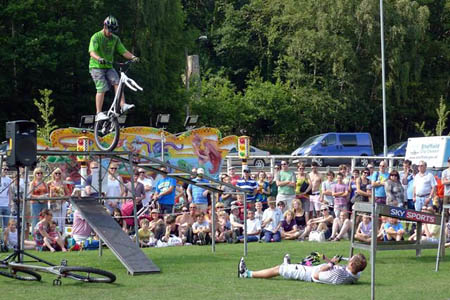
The planned Cliffhanger festival was cancelled following torrential rain
Torrential rain wiped out the Cliffhanger festival, one of Britain’s biggest gatherings for outdoor enthusiasts.
The event was due to take place in Sheffield but the continuing wet summer put paid to plans to stage the festival. The area was put on a flood warning by the Environment Agency.
Volunteer mountain rescuers across the UK were awarded medals to mark their service.
The Queen’s Diamond Jubilee Medal was presented to members of the armed forces and emergency services to mark the monarch’s 60 years on the throne.
The medal was for those having made an honourable service in military, police, prison, and emergency forces, or for outstanding achievement or public service and all members of mountain rescue teams with five years’ or more service were eligible.
The coalition Government announced it was going to spend £2m replacing ‘dull and boring’ signs at the entry to six counties at the heart of the country’s tourism industry.
Culture Secretary Jeremy Hunt revealed plans for the new county boundary signs that the Department for Culture, Media and Sport said would showcase the region’s best features.
Cumbria, North Yorkshire and Derbyshire were among counties to have the new signs, along with Devon, Cornwall and Norfolk in a pilot scheme run by the Culture Department and the Department for Transport.
Three Olympic relay representatives took their torches to a new high.
Fellrunning legend Joss Naylor was one of three torchbearers to make the ascent of England’s highest mountain Scafell Pike.
He was joined by Wasdale Mountain Rescue Team doctor Karen Greene, former mountain racer Angela Brand-Barker and other Wasdale team members on the 978m (3,209ft) mountain peak with the famous Olympic torches.
The Naked Rambler was back behind bars after enjoying just three days of freedom.
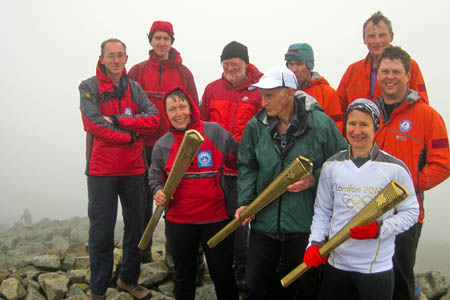
Karen Green, Joss Naylor and Angela Brand-Barker are joined on the summit by Wasdale MRT members Dave Kennedy, Ian Winn, Nick West, Paul Cook, Rob Scott and Chris Cripps
Former Royal Marine Stephen Gough was arrested near Dunfermline by Fife Constabulary for a breach of the peace.
Mr Gough, who gained fame when he walked naked from Land’s End to John O’Groats, has spent the last six years in jail for refusing to put on clothing when he is in public.
Each time he was released from jail, he was immediately re-arrested, but he was allowed to walk from Perth Prison without arrest in an apparent softening of attitude from law enforcers.
He said he was intending to ‘head south’.
But the campaigning nudist was arrested in Townhill, a suburb of Dunfermline, and ended up back behind bars.
The coalition Government announced it would consult the public on extending the England Coast Path to the Isle of Wight.
The island was excluded from provisions to allow access to the English coastline, but the Department for the Environment, Food and Rural Affairs said it was looking at extending the scope of the Marine and Coastal Access Act.
The first section of the path round England’s coast was officially opened at round Weymouth Bay in Dorset in time for the Olympic sailing events.
A father and his 11-year-old son were rescued from Wales’s highest mountain after a major overnight search lasting more than nine hours.
Llanberis Mountain Rescue Team described the rescue on Snowdon as a very demanding callout – its second nine-hour night-time rescue in two days.
The team’s incident controller Phil Benbow said the man and boy, from the Midlands, were poorly equipped and dressed in shorts and trainers inappropriate for wandering off any mountain path even in summer.
Earlier in the week, two climbers stuck on a crag were rescued in a nine-hour operation involving two mountain rescue teams and an RAF search and rescue helicopter crew.
The man and woman, students from the Manchester area, called for help after getting cragfast on Craig yr Ogof on the Nantlle Ridge in the West of the Snowdonia national park.
Aberglaslyn and Llanberis Mountain Rescue Teams went to the aid of the climbers on Craig Cwm Silyn and a Sea King helicopter from RAF Valley attempted to winch the pair off the crag, but were defeated by high winds and lowering cloud.
Scotland’s mountaineering body called on the Holyrood Government to halt what it called the staggering industrialisation of the nation’s mountains with windfarms.
The Mountaineering Council of Scotland said there had been a deluge of applications for new turbines, including more than 200 in the last two weeks.
The council, which represents 11,000 hillwalkers, climbers and mountaineers north of the border, said no more windfarms should be built on the munros and corbetts of Scotland, its highest peaks.
MCofS chief officer David Gibson said: “The sheer scale and number of recent onshore wind farm applications is staggering.”
In August, footpath work began on a popular challenge trail in the Yorkshire Dales.
The project involved walkers on the Three Peaks Challenge route diverting to an engineered path which avoids a badly eroded section of the route across a bog.
The work was undertaken by the Yorkshire Dales National Park Authority using cash it won in a competition run by two outdoor magazines, with a prize from the European Outdoor Conservation Association.
Police appealed to walkers and climbers for sightings of a man who went missing in Snowdonia.
Shayne Colaco, 33, of Stoke on Trent, was believed to have set off for an ascent of Tryfan.
A search on the ground and by air took place around the area for Mr Colaco, who police said was an experienced walker, but no trace of him was found.
Authorities in Nepal banned solo trekking.
The country’s Ministry of Home Affairs said independent travellers heading for the Himalaya would have to be accompanied by a porter or guide.
The move came after the murder of 23-year-old Belgian trekker Debbie Maveau, whose headless body was found in June near a trail in the Langtang National Park.
Access campaigners said the Government must not implement a cut-off date on rights of way until all missing paths have been recorded.
The Open Spaces Society made the point in its submission to the coalition Government’s consultation on the future of rights of way on England.
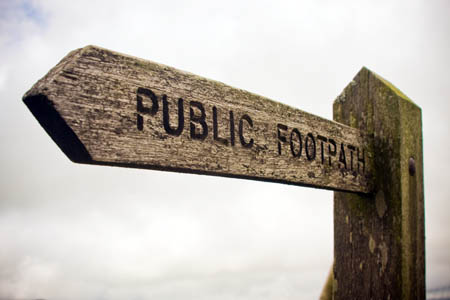
The OSS urged the Government not to implement a cut-off on lost paths
A 2026 deadline for inclusion of rights of way on definitive maps is looming but, half-way into the process, most ‘lost’ routes have still not been mapped, it said.
The recording of the ‘secret’ rights of way was meant to begin 12 years ago as part of the provisions of the act that introduced the right to roam in England and Wales.
A man who went missing on the Coast to Coast route was found after a search by two rescue teams and search dogs – walking in his socks.
The 74-year-old became separated from his walking companion in the Greenup Edge area, between Rosthwaite and Grasmere.
The walking partner reported him missing after reaching Grasmere village, and said the walker, tackling the 309km (192-mile) route, had had trouble with his footwear and had fallen behind.
A second police force warned hillwalkers not to rely on smartphone apps as their sole navigation tool on the mountains of Scotland.
Northern Constabulary echoed earlier comments by Grampian Police who said lives were being put at risk by people venturing on to the high mountains without adequate equipment and the ability to find their way. The statement followed two rescues.
A spokesperson for Northern Constabulary said: “On two occasions in recent days, both police and Cairngorm Mountain Rescue Team have been involved in the rescue of lost walkers who were relying entirely on apps which proved to be insufficient on their own.”
Groups of UFO believers again made the trip to two British hills to pray for peace and spiritual uplifting.
The members of the Aetherius Society gathered at Pen y Fan, south Wales’s highest mountain and The Old Man of Coniston, once the highest point in Lancashire, for ceremonies at the sites they regard as holy mountains.
The society members are advocates of the late George King, who believed there are 17 other holy mountains throughout the world, charged with spiritual energy by extraterrestrials from Venus and Mars, and by other highly evolved spiritual intelligences.
A walking holidays co-operative that can trace its routes back to Victorian Britain said it would offer children the chance to become shareholders.
HF Holidays, which began life almost a century ago as the Holiday Fellowship, was taking advantage of a change in law to allow under-16s to become members.
The company is now one of the UK’s largest co-operatives in the travel sector and wanted to encourage children to become shareholder members and begin a life-long engagement with walking as a healthy activity.
A huge search for a missing survival instructor was called off when the man walked up to a television camera crew covering his disappearance.
The outdoor instructor, Steve Walker from Essex, sparked a massive two-day search after he was reported missing in the South of the Brecon Beacons national park.
More than 45 volunteers and police officers braved torrential rain and treacherous conditions to search for the missing man.
Officers from Dyfed Powys Police, four mountain rescue teams, search dog teams and the RAF search and rescue helicopter from RMB Chivenor in Devon, were called out after campers raised the alarm at Pontneddfechan, near Neath, in the Brecon Beacons.
The four campers from Romford, Essex, had been on an outdoor survival expedition to the area with 34-year-old instructor Steve Walker, also from Romford.
Another bizarre rescue saw a woman tourist take part in a major search – for herself.
Police in southern Iceland mounted a hunt for the woman when she was reported missing after visiting the world’s largest volcanic canyon.
Passengers on a bus at Eldgjá said the woman had left the vehicle and not returned. But the tourist, who was described as of Asian appearance and a good English speaker, had changed her clothes before returning to the bus and fellow passengers failed to recognise her.
Rescuers and police took part in a search and a coastguard helicopter was put on standby but, unknown to them, one of the volunteers who joined the hunt for the missing tourist was actually the subject of their search.
The Icelandic newspaper Morgunblaðið reported that it eventually dawned on the woman that she was in fact the missing person and told the police.
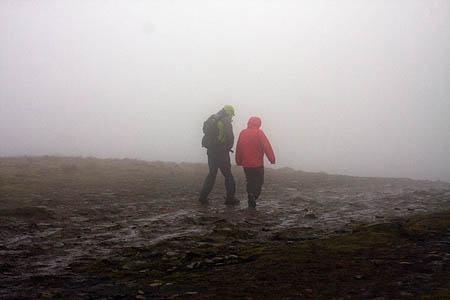
Summer was the wettest on record, and things were not about to improve
Official figures confirmed what outdoor enthusiasts already suspected: this summer has been one of the wettest, dullest and coolest on record.
Met Office data showed that the three summer months were cumulatively the wettest since 1912.
Across the UK, 366.8mm of rain fell in June, July and August, not quite enough to beat the earlier record of 384.4mm.
The gruelling Ultra-Tour du Mont Blanc would take place wholly in France, organisers said.
Difficult weather conditions high on some of the Alpine passes forced them to alter the route to avoid some areas, meaning runners would not pass through Italy and Switzerland as in previous years.
The course was shortened as a result to 100km, and the new route will entail about 6,000m of ascent.
Organisers said conditions on the Col du Bonhomme, Col de la Seigne and Grand Col Ferret were too difficult to run the race over.
British ultrarunner Lizzy Hawker stamped her authority on the race with a fifth victory in the women’s section.
Hawker crossed the finishing line at Chamonix in 12hrs 32mins 13secs to take the women’s title in the tenth running of the event.
She came in 16th overall in the shortened race. Frenchman Francois d’Haene was the overall winner of the 103km race, with a time of 10hrs 31mins 30secs, 31 minutes ahead of Swede Jonas Buud, with US athlete Michael Foote third with a time of 11hrs 19mins 0secs.
British men’s hopeful Jez Bragg had a disappointing race, dropping out early on the course.
In September, Everest summiteer Sir Chris Bonington scaled the heights of western Europe’s tallest building when he joined fellow charity fundraisers in abseiling from its pinnacle.
The elder statesman of British mountaineering joined a group making the drop from the top of The Shard, the 310m (1,017ft) glass edifice on London’s South Bank.
Sir Chris, chairman of outdoor brand Berghaus, was joined by a property lawyer, a mobile phone company magnate, the wife of the Foreign Secretary and numerous supporters of the Outward Bound Trust, one of the two charities to benefit from the event.
Mountain rescuers issued a warning – to colleagues along the Coast to Coast Walk route – after a hapless group had to be rescued twice in two days.
Rescuers in the Lake District expressed their frustration at the group’s refusal to heed advice to give up their challenge.
A mountain rescue team member suffered a serious ankle injury during one of the night-time rescue missions after the group of three walkers, who were relying on a guidebook rather than maps, twice went astray and were reported overdue.
Three separate mountain rescue teams plus members of the Lake District Mountain Rescue Search Dogs were involved in operations to find the walkers who in both instances were found off the route of the 309km (192-mile) Alfred Wainwright-devised walk that starts at St Bees Head and ends in Robin Hood’s Bay.
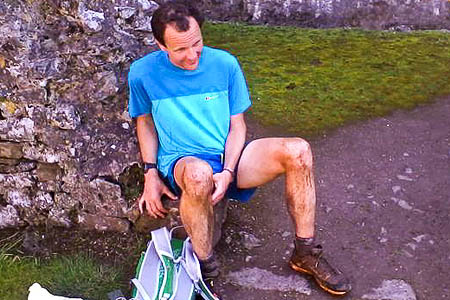
Steve Birkinshaw at the finish of the Dragon's Back
One of the world’s most gruelling mountain races got underway, with 91 competitors from 14 different countries tackling the 320km (199-mile) Dragon’s Back Race, which also involved more than 15,000m of ascent.
The route ran from north Wales down the backbone of the nation to finish five days later at Carreg Cennen Castle in the Brecon Beacons.
Steve Birkinshaw won the race.
The Cumbria-based Newcastle University research associate was first home at the finish at Carreg Cennen Castle in the Brecon Beacons.
Helene Whitaker, one of the winners of the original Dragon’s Back, was first woman to finish the 2012 event.
The woman who oversaw the forest sell-off debacle was axed in David Cameron’s Cabinet reshuffle.
Environment Secretary Caroline Spelman was replaced by former Northern Ireland Secretary Owen Paterson, a keen horseman and opponent of bureaucracy.
Caroline Spelman’s reign at the Department for Environment, Food and Rural Affairs saw one of the coalition Government’s biggest u-turns as it backpedalled on plans to sell off publicly owned forests and woodland, prompting half a million people to sign a petition opposing the plans.
Outdoor industry representatives launched a campaign to get the country on its feet.
Britain on Foot was the brainchild of Andrew Denton, chief executive of the Outdoor Industries Association, the trade body for companies and organisations in Britain’s outdoor sector.
The campaign had the backing of the Mountaineering All-Party Parliamentary Group and was officially launched at a bash at Westminster, hosted by Labour MP John Mann and Tory MP David Rutley.
A volunteer rescue team appealed for help in recovering two plaques that were removed from its headquarters.
The signs were stolen from the Grassington base of the Upper Wharfedale Fell Rescue Association.
The team, which carries out rescues both on the fells and in the caves of the Yorkshire Dales and surrounding areas, said the plaques would have little scrap value but were of great worth to the team.
The missing plaques mysteriously reappeared later the same week.
A mountain rescue expert told hillwalkers GPS mobile phones are only fit for urban walking, and anyone heading for the hills should learn to use a map and compass.
Ochils Mountain Rescue Team secretary Tom Lockie was speaking after the rescue of a group of school students got lost in mist on a hill in the Ochils.
The party of four teenagers and two adult helpers were relying on mobile phones to work out their position.
Britain’s biggest walking campaigning organisation called for the setting up of a charity trust to oversee England’s national trails.
The charity said coalition Government proposals to hand over responsibility of paths such as the Pennine Way and Hadrian’s Wall Path puts them at risk and ignores the commercial potential of the routes.
Explorer Sir Ranulph Fiennes he would attempt the first winter crossing of the Antarctic continent.
He said he would sail south this year, the centenary year of Captain Scott’s death in the Antarctic and would be joined by five colleagues in the planned trek dubbed The Coldest Journey.
The expedition will have to contend with temperatures as low as –90C and near-constant darkness on the route across the polar continent, a distance of almost 4,000km.
Donations made in memory of two climbers who died in an avalanche on the Mont Blanc range were used to buy safety equipment for volunteers who help England’s search and rescue dog handlers.
Supporters and members of the public raised more than £2,000 in memory of John Taylor and his mountaineering companion Steve Barber who were killed on Mont Maudit and the Search and Rescue Dogs Association, for which Mr Taylor acted as a ‘dogsbody’ bought safety gear for the volunteer ‘casualties’ with the cash.
Another group of explorers unveiled plans to complete the Antarctic trek that Sir Ernest Shackleton attempted during his ill fated expedition.
The Imperial Trans Antarctic Expedition will tread in the intended footsteps of the explorer and his team to mark the centenary of the original journey, which ended with an epic rescue which saw all the adventurers survive.
Six men and women will set off in August 2014, exactly 100 years after Shackleton began his trip.
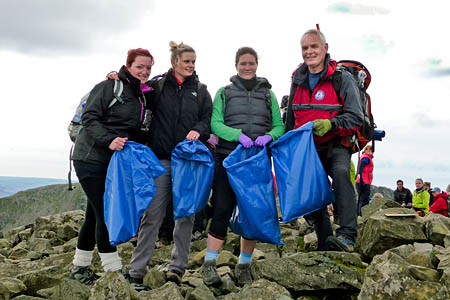
Richard Warren with the litter pickers on Scafell Pike
A team of volunteers collected four bagfuls of rubbish from England’s highest mountain.
The staff from employment agency Adecco in Kendal mounted their clean-up of Scafell Pike after seeing the disgusting state of the 978m (3,209ft) summit reported on a BBC television programme.
But the volunteers were shocked to be asked by members of the public on the mountain if they could dump their own rubbish in the women’s refuse bags.
Richard Warren of Wasdale Mountain Rescue Team, who joined the litter pickers on Scafell Pike, said: “They were of course very politely reminded that it was not a paid service and they should remove their own rubbish.”
There were tragedies in the outdoor world to remind us all of the hazards of venturing on to Britain’s hills and countryside.
The year began in January with the sad news of the death of Lee Jones, 19, of Derbyshire, whose body was found in Piers Gill on Scafell Pike. Mr Jones had become separated from his friend during their trip up England’s highest mountain.
Catherine Stainsby, 41, from Swinton, Malton in North Yorkshire, died after a kayaking accident in the Howgills.
Ms Stainsby was part of a group canoeing at Hobdale Beck, Cautley, Sedbergh which got into difficulties.
Michael Machell, a one-time member of the Langdale Ambleside Mountain Rescue Team, was killed in a climbing accident in California.
The 23-year-old was a former student at the Ambleside campus of the University of Cumbria, where he graduated with a first-class honours degree.
Team leader Nick Owen said: “Michael was a great friend, a regular climbing partner, and a committed team member. His youthful energy and boundless enthusiasm was infectious.
“He will be sadly missed by all current and former team members.”
The search for a walker missing in the Cairngorms for five days was called off.
A major search was undertaken by up to 70 rescuers, but no sign of Grant Cunliffe was found. Members of Cairngorm and Braemar Mountain Rescue Teams, RAF Leuchars Mountain Rescue Team and officers from Northern Constabulary and Grampian Police were joined by Search and Rescue Dogs Association members and a Sea King helicopter from RAF Lossiemouth on the third day of the search.
Mr Cunliffe’s body would be found six months later in the Braeriach area.
A walker died after a fall in the Highlands. Craig Cathie, 19, fell between 6m and 9m (20ft and 30ft) while walking with a group of 16 on the Flowerdale Estate near An Àrd, south of Gairloch in Wester Ross.
Mr Cathie, of Moodiesburn, near Glasgow suffered head injuries in the fall and was treated by Dundonnell Mountain Rescue Team at the scene before being airlifted to Raigmore Hospital, Inverness, by a Stornoway Coastguard search and rescue helicopter, but died in hospital.
In February, Paul Guest, 32, of Kidderminster, Worcestershire, died and David Warden, 46, of Perth, was seriously injured in a climbing accident on Ben Nevis. Police said the pair fell ‘a considerable distance’ from near the summit of the 1,344m (4,409ft) mountain.
The climbers were near the top of Zero Gully on the North Face when they both fell.
Walker Peter Huntley, 55, of Preston, Lancashire died after falling 200ft (60m) from a Lakeland fell.
He was with a friend on the High Street range when the accident happened.
Mr Huntley fell from a ledge and members of the Penrith Mountain Rescue Team and RAF Kinloss Mountain Rescue Team, along with an air ambulance, went to the site, above Blea Water, but the walker was pronounced dead at the scene.
In April, Stuart Tyrer, 23, of Cheadle Hulme in Greater Manchester, fell to his death on Wales’s highest mountain while walking on the East Ridge after visiting the summit.
He was reported missing when he failed to return from a walk on the mountain.
Rescuers were alerted when a friend of the man met a group of Search and Rescue Dogs Association Wales handlers who were training in the Pen y Pass area yesterday evening.
A major search took place, with members of Aberglaslyn and RAF Valley Mountain Rescue Teams joining colleagues from the Ogwen Valley Mountain Rescue Organisation and Llanberis team members joining the hunt for the man.
A Sea King helicopter from 22 Squadron at RAF Valley also joined the search.
The body of the walker was found by members of Llanberis MRT and dog handler Rich Beech with his animal Scout.
Brian Belfield, 63, of Leek in Staffordshire, died while taking part in the Buttermere Sailbeck Fell Race. He was reported missing after he failed to return to his lodgings.
Cockermouth and Keswick Mountain Rescue Teams and search dogs and handlers mounted a search involving 50 volunteers and called in help from Penrith, Wasdale and Kirkby Stephen Mountain Rescue Teams.
The crew of a Sea King helicopter from RAF Boulmer spotted Mr Belfield’s body between Sail and Crag Hill at 9.43am and winched it aboard.
Mr Belfield, a painter and decorator, was a member of the Staffordshire Moorland Athletics Club.
In May, hillwalker Paul Henry died on the Isle of Arran.
His body was recovered from Glen Rosa after he went missing.
Mr Henry, 31, of Stranraer, Wigtownshire, had been seen on Saturday at the ferry terminal in Ardrossan, Ayrshire, but the last contact with his family was the following day.
In June, a man’s body was found by walkers on a Snowdonia mountain.
The remains of Wayne Edward Mitchell were found on Cadair Idris in the South of the national park.
The man’s body was discovered in a craggy area between the 893m (2,930ft) summit and Llyn y Gadair and was recovered by members of the Aberdyfi Search and Rescue Team.
Police used DNA to confirm the identity of the 40-year-old, from Blaenau Ffestiniog, after the discovery on the mountain
Two people died within days of each other in falls from one of the Lake District’s most popular scrambling routes.
Howard Gladwyn, 48, of Menston, West Yorkshire, fell between 700 and 800ft (213m and 244m) from the scrambling route on Pavey Ark.
He was with a group of friends tackling the grade-one scramble on the 700m (2,297ft) fell when he came off the route.
Five days later, 37-year-old Susannah Cox of Lancaster fell to her death from Jack’s Rake on the same route.
A 12-year-old boy suffered serious injuries when he fell later the same month from Jack’s Rake.
The boy fell on the Pavey Ark route, injuring his head and spine.
Three Britons were among nine killed in an avalanche in the Alps.
Former British Mountaineering Council general secretary and Mountain Guide Roger Payne and his clients Steve Barber and John Taylor were hit by the slab avalanche on Mont Maudit.
The avalanche struck six others: two Germans, two Spaniards and two Swiss, also perished on the 4,465m (14,649ft) peak.
A walker died after falling 300ft from a Snowdonia mountain in an incident described by rescuers as a tragic accident.
Guy Litchfield, 23, of Durweston, near Blandford Forum, Dorset, was pronounced dead after being airlifted to hospital following a 100m fall from Glyder Fach.
The walker was with another 23-year-old on the 994m (3,261ft) mountain yesterday when the accident happened.
In September, police named a walker whose body was found on a munro.
Alexander Sproule, 74, died on Ben Cruachan. His body was found after he was reported missing by his walking group when he failed to return from a trip up the mountain.
The Edinburgh man became separated from his companions while coming down from the 1,126m (3,649ft) munro.
James Baillie of Balerno, Edinburgh, died after embarking on a solo walk in Glen Etive.
Rescuers found the 74-year-old’s body on Stob Dubh after a major search lasting two days.
A Royal Navy Sea King search and rescue helicopter from HMS Gannet in Ayrshire joined the operation, which involved Glencoe, Oban and RAF Leuchars Mountain Rescue Teams, aided by Search and Rescue Dogs Association handlers and animals.
Andrew Tedder, 49, of Emley near Huddersfield, West Yorkshire, died while coming down Ben Nevis. He was descending the mountain via the tourist track when he fell near the top of a steep river gully.
The insurance agent was found by members of the Lochaber Mountain Rescue Team after he fell during his descent of the 1,344m (4,409ft) mountain, but he had died from his injuries.
Police searching for a missing camper found his body on the Isle of Lewis. Tamas Gador’s remains were found in the Dail Mòr area of the Isle of Lewis.
Coastguard cliff rescue teams, the Stornoway helicopter and a lifeboat all took part in recovering the man’s body.
Mr Gador’s father had flown from his home in Hungary to help in the search.
Seven British trekkers died in a plane crashed near the Nepal capital Kathmandu.
The Dornier aircraft, operated by Sita Air, had just taken off from Kathmandu Airport when the pilot reported the plane had struck a bird and was on fire.
The trekkers were on their way to the Everest area.
In October, police found a body on a Highland pass of a man who went missing in the area four months earlier.
The body of Steven Seel, 30, of Strathpeffer was recovered from a gully on a mountain on the Bealach na Bà in Applecross.
A fellrunner died after collapsing in a Lakeland race, despite the efforts of mountain rescuers.
Darren Holloway, 42, was taking part in the Ian Hodgson Mountain Relay on Sunday when he collapsed on the Fairfield Horseshoe.
The runner, from Ilkeston in Derbyshire, was on the ridge between Hart Crag and Fairfield when the incident happened.
Fellow runners and hillwalkers in the area went to Mr Holloway’s aid and performed cardio-pulmonary resuscitation on the fellrunner, but to no avail.
The body of missing hillwalker and ornithologist Euan Wright was found on the coastline of the Fowlsheugh nature reserve at Crawton.
Officers made the discovery Stonehaven in Aberdeenshire.
Anna Campiche, 26, of Kidderminster, Worcestershire, died in a fall from a mountain in Snowdonia.
The 26-year-old was fatally injured in the incident on Garnedd Ugain.
Police were alerted with a report that the woman had fallen from Crib y Ddysgl on the Snowdon massif.
Ms Campiche was originally from Switzerland.
In November, the body of a missing walker at the centre of a major search was found close to the search area.
A member of the public discovered the body of 70-year-old John Rayton near the village of Rimington in Lancashire.
Mr Rayton, of Preston, was reported missing when he failed to return from a walking trip. His family said they believed he had gone by public transport to the Gisburn area.
His body was found at Ings End, 4km (2½ miles) south-west of Gisburn.
A walker died after falling 60m (200ft) from a Snowdonia peak.
The 72-year-old fell from the 633m (2,077ft) Y Garn on the Nantlle Ridge.
Aberglaslyn Mountain Rescue Team was alerted after the incident on the mountain, at the eastern end of the ridge.
A Sea King helicopter from RAF Valley on Anglesey joined the rescue operation.
An Aberglaslyn MRT spokesperson said: “A group of six friends were out for a walk on the popular route and were descending from the peak when the accident occurred.”
A man rescued after a kayaking incident in Loch Fyne died in hospital.
Strathclyde Police said they were called to Tarbert in the north of the Kintyre peninsula in Argyll to assist the Coastguard who had been called to help three men.
One of the men had capsized and the Royal National Lifeboat Institution inshore lifeboat from Tighnabruaich and the Stornoway Coastguard search and rescue helicopter went to the men’s aid after being alerted at 6am.
The three men were taken to the Mid Argyll Community Hospital in Lochghilphead but one of the men, in his 20s, died shortly after arriving at the hospital.
In December, James Blackburn of Darrington, West Yorkshire, died after falling 600ft in icy conditions from England’s second-highest mountain.
The walker slipped and fell from the Lord’s Rake traverse path on Scafell.
His companion had to be rescued after getting stuck on crags.
Rescuers were alerted at 10am after police received a 999 call saying a walker had fallen and suffered serious injuries on the 964m (3,163ft) mountain.
Richard Warren of Wasdale Mountain Team said the two men were making their way across the Lord’s Rake traverse path, Scafell, Wasdale when one of them slipped on the frozen snow and ice and fell around 200m (600ft.).
The year ended with tragedy as Mountain Guide Graham Paterson’s body was found on the Cuillin range on Skye.
Mr Paterson’s body was found by mountain rescuers, two days after one of his clients reported he had fallen and injured himself.
The 60-year-old, from Carbost on Skye, ran Skye Hi Mountain Guides with his wife Annie and was an experienced mountaineer and hillwalker, operating in the mountains of Skye and the Highlands of Scotland for 17 years.
More bad news from the outdoors world came when a charity offered a £1,000 reward after the discovery of the body of a golden eagle, which it said suffered a lingering death.
The Royal Society for the Protection of Birds Scotland said the body was found lying face down, with its wings folded, under a tree branch, close to a layby on a quiet country road near Aboyne, and was seized as evidence by officers from Grampian Police.
The eagle, which had a satellite transmitter attached to it, was found on 5 May. Both its legs were broken.
A long-distance route tackled by thousands of walkers every year was set to be officially waymarked after authorities approved the move.
The Coast to Coast Walk was devised by the late Alfred Wainwright and runs from St Bees on the Cumbrian coast to Robin Hood’s Bay in North Yorkshire.
The 309km (192-mile) journey was devised by the guidebook writer using public rights of way.
Although the route is waymarked sporadically by some local authorities as it wends its way through their districts, there is no official symbol for the route.
A British ultrarunner started preparing for his ultimate challenge: an unsupported walk to and from the North Pole.
Tim Williamson is a virtual unknown on the global adventure scene, but if successful his will become the longest, solo and unsupported expedition in the world.
The 25-year-old plans to start his trek on 13 January next year from Resolute Bay in northern Canada for a walk, without skis, of at least 3,540km (2,200 miles) lasting between 100 and 120 days.
A record winner of one of cycling’s most gruelling events regained his crown after ceding the title the previous year.
Yorkshireman Rob Jebb won the Three Peaks Cyclo-Cross Race in difficult conditions with driving winds and heavy rain lashing the hills on which the event is run.
Jebb’s ninth win in 3hrs 09mins 21secs on the 61km (38-mile) course came with a 10-minute margin over his Team Hope Factory Racing colleague Paul Oldham.
In October, renowned adventure filmmaker Alastair Lee’s latest film was an offering beyond the ordinary with tales of disguise, shamanism and jungle nasties.
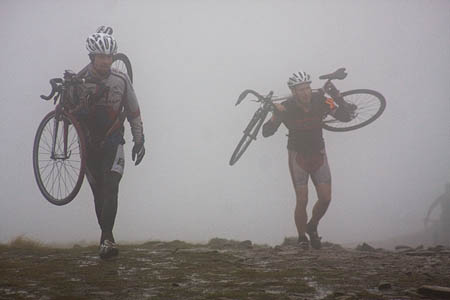
Conditions for the Three Peaks Cyclo-Cross event were less than ideal
Autana followed climbers Leo Houlding, Jason Pickles and Sean Leary in their quest to summit the Amazonian table-top mountain Cerro Autana – Sir Arthur Conan Doyle’s Lost World.
The trio, two Brits and one US climber, attempt the unclimbed east face of the remote tepuy in the movie.
A police chief paid tribute to the unpaid volunteer mountain rescue teams who took part in the search for missing Machynlleth girl April Jones.
At least two dozen different teams joined the hunt for five-year-old April, who had last been seen playing near her home.
Teams from as far away as North Yorkshire joined rescuers from Wales in an extensive search for the girl, without success.
A spokesperson for Mountain Rescue England and Wales, the umbrella body for teams south of the border, said: “Our focus here has been to find April, applying our skills to the intelligence available to us.”
Superintendent Ian John of Dyfed-Powys Police said: “I would like to pay tribute to the mountain rescue teams who have worked themselves to a standstill in the search for April.”
The girl’s body has still not been found.
Investigators revealed the helicopter in which controversial Honister Slate Mine owner Mark Weir died had a counterfeit maintenance certificate.
And a probe by the Air Accidents Investigation Branch following the fatal crash near the Lake District tourist attraction revealed Mr Weir was not qualified to fly at night.
The AAIB, the Department for Transport body that looks into the causes of air incidents, said there was no evidence of mechanical failure but it was fitted with a military engine which invalidated its airworthiness certificate in the UK.
Mr Weir’s Gazelle was Hungarian registered and he held a crew member certificate issued by the Hungarian Civil Aviation Administration which validated his private pilot’s licence for flights in Hungarian-registered aircraft.
Outdoor writers and photographers awarded their annual innovation award to a stove which uses twigs and pine cones as fuel to cook backpackers’ meals, while at the same time recharging electronic devices.
The BioLite CampStove was named by the Outdoor Writers and Photographers Guild as this year’s Derryck Draper Award winner at the organisation’s annual gathering.
Previous winners of the award have included NeoShell Fabric by Polartec, the Laser Photon tent by Terra Nova and the Therm-a-Rest NeoAir mattress by Cascade Designs.
Two rescue teams were faced with finding a new source of cash after the decision to end a long-running fundraising event.
The Broughton Game Show has been held for 33 years in the grounds of a North Yorkshire stately home, raising money for the Upper Wharfedale Fell Rescue Association and the Cave Rescue Organisation.
But the committee that runs the event announced the show had come to an end. More than £325,000 has been raised for the two volunteer teams over the years.
A missing man was found safe and well after a group of walkers came across him and said a search was underway for him.
The hillwalker, in his 60s, was reported overdue after going walking in the Glen Cannich area of the north-west Highlands.
Northern Constabulary co-ordinated a search the day after he failed to return from a solo walk.
Britain’s ancient commons are in danger from surreptitious ‘filching’ by companies and individuals, a campaign group warned.
The Open Spaces Society outlined its plans to halt the loss of common land by encroachments that include garden extensions and car parks.
The society’s general secretary Kate Ashbrook announced its plans at the annual meeting of the Association of Commons Registration Authorities in Birmingham.
Dutch mountaineer Frits Vrijlandt took over as president of the Union Internationale des Associations d’Alpinisme pledging to bring calm to an organisation that has been wracked by a turbulent recent past.
Former president Mike Mortimer stood down following a vote of no confidence.
The UIAA has had five different presidents in the past eight years.
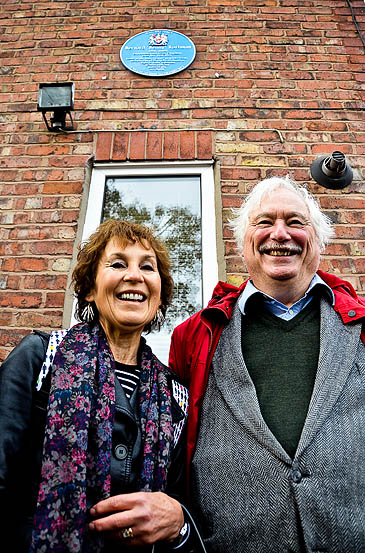
Benny Rothman's son and daughter Professor Harry Rothman and Marion Thilo at the unveiling of a blue plaque at his former home
One of the pioneers of access to Britain’s uplands had a blue plaque unveiled in his memory.
Benny Rothman, a Manchester Communist, led the Kinder Scout Mass Trespass in April 1932 that led to his jailing along with four fellow trespassers.
Ramblers attended the unveiling of the plaque, which was placed at his former home in Crofton Avenue in Timperley where he lived for 58 years.
Staff from the National Trust for Scotland swapped fleeces and walking boots for snappier dress to celebrate the latest James Bond release, part of which was filmed on one of the charity’s top outdoor properties.
Glencoe property manager Scott McCombie and ranger Rachel McKerral recreated the roles played by Daniel Craig and Dame Judy Dench in Skyfall.
The charity couldn’t run to an Aston Martin DB6, so substituted one of its Land Rovers.
Alpine Club president Mick Fowler celebrated his 30 years in mountaineering with his climbing partner Paul Ramsden by posting a first route on a technically difficult remote mountain.
The man dubbed the Climbing Taxman – Fowler is an HM Revenue and Customs officer – made the first ascent of the Prow of Shiva, a 6,142m (20,151ft) peak in the Pangi District of the Indian Himalaya.
Mr Ramsden described the climb as the best he had ever done.
The Berghaus sponsored athlete, celebrating 30 years of climbing, completed the route with Paul Ramsden over seven days earlier this month and then descended the unclimbed south east flank in a further two days.
Mountain rescuers said a family found in atrocious conditions on a south Wales mountain after a six-hour search was lucky to be alive.
The 51-year-old woman and her teenage son and daughter were rescued from a 690m (2,264ft) mountain on the border between Wales and England.
The trio got lost on Twmpa in the Black Mountains. They had no coats or compass.
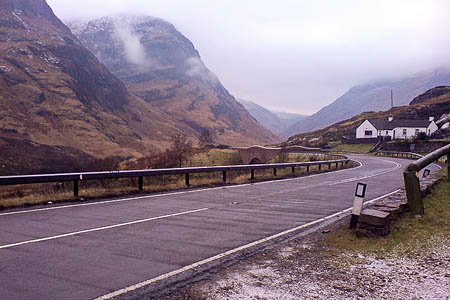
Allt-na-Reigh, right, the white bungalow formerly owned by Jimmy Savile. Photo: Paul Bisland CC-BY-SA-2.0
Police in the Highlands reported a house formerly owned by Jimmy Savile has been daubed with abusive slogans.
The white bungalow at Allt-na-Ruigh in Glencoe was Savile’s Highland bolthole for many years.
Northern Constabulary said the graffiti was painted on the building overnight. The bungalow’s walls and windows were plastered with ‘Jimmy the Beast’ slogans.
The late television and radio presenter, since named as Britain’s most prolific sex abuser, bought the house, named Allt-na-Reigh on 1:50,000 Ordnance Survey maps, in 1998. The cottage formerly belonged to mountaineering luminary Hamish MacInnes.
Campaigners celebrated victory after an unlawful ‘emergency’ fence across national park land was removed.
The fence crossed common land in the Brecon Beacons and was erected by a Government department during the foot and mouth disease crisis of 2001.
The Gap Road fence should have been removed in 2006, but it took a six-year campaign by the Open Spaces Society and Ramblers Cymru to get the fence removed.
Two lost walkers on England’s highest mountain were found sheltering in an emergency stretcher box after a major search.
More than 50 volunteer mountain rescuers from four different teams were involved in an eight-hour search for two walkers lost on England’s Scafell Pike.
The pair left the 978m (3,209ft) summit of the mountain in the wrong direction.
Work on two new cairns to guide walkers and climbers on Britain’s highest mountain was completed.
The John Muir Trust consulted the public on the two new structures, which mark the descent point into Coire Lies and the top of Number Four Gully on Ben Nevis’s North Face.
The building of the two cairns followed the removal by the trust, which owns most of the summit of the mountain, of a series of abseil posts and the two old markers which the new cairns have replaced. The old Number Four Gully marker had been vandalised.
A rescue team warned of the dangers of tackling an accident blackspot route after it had to go to the aid of two separate groups.
Keswick Mountain Rescue Team said the walkers involved could have been killed in the incidents on Sharp Edge on Blencathra.
The team was alerted after a teenager fell from the edge and others on the route got stuck in conditions described by the team as treacherous underfoot. Five walkers and a dog got into difficulties while trying to make their way down the ridge.
In November, Britain’s biggest walking charity said allowing public access to the outdoors did not pose a major risk of spreading the deadly disease affecting the country’s ash trees.
The Ramblers said that expert guidance from the Forestry Commission is that continued public access does not pose a significant risk to the spread of Chalara dieback of ash.
But it advised walkers to take note of any signs posted in affected areas, and to alert the authorities if they spot any trees they think may be suffering from the fungal disease.
Rescuers responding to a call for help from a pair of walkers caught out overnight in snow were alarmed to find one of them dressed in a Napoleonic outfit wielding a musket and sword.
Penrith Mountain Rescue Team was called out to help the walkers who had spent the night on Great Dun Fell in the northern Pennines.
The team was alerted and enlisted the help of Kirkby Stephen MRT as the Penrith team had been unable to contact the pair by mobile phone after the initial call from the stranded walkers to police.
A Penrith team spokesperson said the duo was walking the Pennine Way for charity. “One was dressed in full Napoleonic dress, complete with musket and sword.
The Olympic torch that Everest summiteer Sir Chris Bonington took to the top of Wales’s highest mountain was auctioned to raise cash for a charity that helps Nepalese porters and their families.
Bids opened for the torch, which the mountaineer carried to the 1,085m (3,560ft) summit of Snowdon in May as part of the Olympic torch relay.
Proceeds from the auction went to Community Action Nepal, the charity founded by fellow Everest climber Doug Scott.
Organisers of the auction estimated the torch has a value of between £8,000 and £12,000.
In the end, Londoner Richard Campbell-Jackson submitted the winning bid of £13,500.
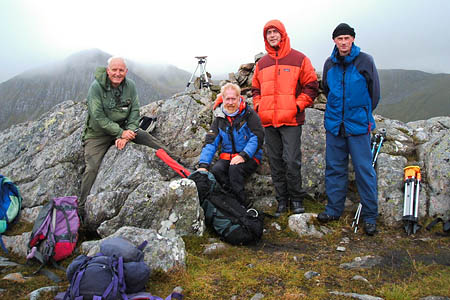
The surveyors in action during the twin corbett expedition
A survey by a pair of hill sleuths led to the separation of Highland twins.
Two peaks above Glen Shiel that had previously been classified as a twin corbett were found to differ in height by about a foot, meaning one of the hills was demoted.
The on-off saga of the twin corbetts had been running for decades, but was decided by amateur surveyors John Barnard and Graham Jackson who, along with Andy Nisbet and Dave McGimpsey of the Scottish Mountaineering Club spent hours measuring the heights of the two hills.
The threat of new wild camping bans loomed as national park bosses unveiled plans to transform part of the Highlands with new campsites, motorhome facilities and commercial kiosks.
Loch Lomond and the Trossachs National Park Authority said the developments would make the area a world-class destination to match California’s Yosemite.
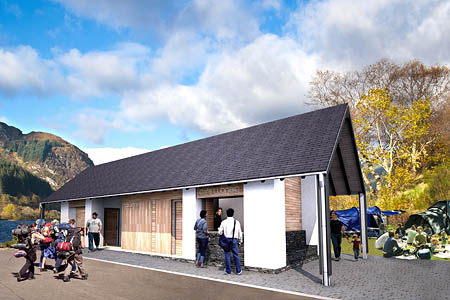
An impression of the proposed Loch Lubnaig centre. Image: Loch Lomond and the Trossachs NPA
The 5 Lochs visitor management plan, which will cost £850,000 initially, would see the establishment of a series of ‘informal’ camp sites similar to the one at Sallochy on the east shore of Loch Lomond, in an area where wild camping was banned under a national park bylaw.
Responsible wild camping is a right enshrined in Scots law under the Land Reform (Scotland) Act.
The chair of a House of Commons select committee told a Government minister about worries over the closure of two search and rescue helicopter bases that might lead to more deaths.
MP Louise Ellman, who heads the transport committee, wrote to Secretary of State Patrick McLoughlin to express the MPs concern over planned changes to how rescue aircraft operate.
At present, RAF, Royal Navy and Coastguard crews provide cover for non-military rescues in the UK, often providing invaluable backup to the volunteer mountain rescue teams who often call on the helicopters to reach stricken walkers, climbers and mountain bikers.
The service is due to be privatised in 2016.
Climber and raconteur Andy Kirkpatrick announced he was giving up writing – and promptly won a major prize for mountain literature.
The Hull-born climber was named winner of the Boardman-Tasker Award at the Kendal Mountain Festival for his book Cold Wars.
The previous day, he wrote on his blog: “Goodbye to all that.
“Being a climbing writer just didn’t work out for me, but I gave it a shot.”
A team of schoolchildren was enlisted to follow climber Leo Houlding’s latest adventure, which he calls ‘the last great climb’.
The Cumbrian athlete worked with six schools that will monitor his progress from the warmth of their classrooms while he attempts the Wolf’s Tooth thousands of miles to the South in the sub-zero temperatures of the Antarctic.
The climber, who has now reached the Antarctic, is accompanied on his expedition by film-maker Al Lee, whose account of Houlding’s climb on to the Amazonian ‘Lost World’ of Autana.
The target of the climbing team which also includes Sean Leary, Jason Pickles, David Reeves and Chris Rabone is the 2,930m (9,613ft) Ulvetanna – Norwegian for Wolf’s Tooth.
One of Britain’s top ultrarunners announced plans to cover the entire length of New Zealand in a 50-day-challenge.
Jez Bragg is currently tackling the 1,898-mile Te Araroa Trail which starts in Cape Reinga on the North Island and finishes on the South Island in Bluff.
He is supported by The North Face outdoor brand, and a small back-up team, though for long stretches he will be running on his own in inaccessible parts of the country.
A company spokesperson said: “The Te Araroa Trail opened in December 2011 and runs the full length of New Zealand from the top of the North Island to the bottom of the South Island.”
Within days of Bragg’s plans being announced came the news a former Brit was already half-way along the route in his attempt.
Leicester-born expat Richard Bowles had completed about 1,600km of the Te Araroa Trail in New Zealand after setting off on 13 October.
Like Bragg, he aimed to run the trail, which runs for 3,054km, from Cape Reinga on the North Island to Bluff at the tip of the South Island.
The British Mountaineering Council said it would draw up a landscape charter to guide its representatives on how to deal with developments in the few remaining wild places in England and Wales.
The BMC’s chief executive Dave Turnbull outlined the plan at the weekend gathering during the Kendal Mountain Festival.
Its area committees will use the document in the light of a similar policy manifesto published by its sister organisation the Mountaineering Council of Scotland for protecting wild landscapes north of the border, which the BMC supported.
A conservation charity condemned the latest proposal to build a tourist zip-wire down the side of a Lake District fell.
Honister Slate Mine submitted scaled-down plans for the aerial slide, reducing its length and altering its start point on Honister Crags.
Its original proposal was turned down by Lake District national park planners, after the company had withdrawn an earlier plan.
But the Friends of the Lake District said the new plans are still inappropriate for the location, on the side of Fleetwith Pike.
Britain’s biggest walkers’ charity welcomed new official guidelines that said walking and cycling can transform the nation’s health.
The Ramblers pointed out the latest guidance from the National Institute for Health and Clinical Excellence’s (Nice) said walking is the simplest way of increasing physical activity.
The campaigning charity backed calls for call for local authorities, voluntary organisations, schools, workplaces and the NHS to work together to encourage and support people to be more physically active.
Nice said about two-thirds of people in England are not physically active enough to meet the official recommendations for good health – with serious and expensive consequences.
A judge quashed an order banning off-roaders from a Peak District track.
The national park authority had an experimental order in place for 15 months on Chapel Gate, which runs between Edale and Chapel-en-le-Frith.
But the Trail Riders’ Fellowship, a pressure group for trail motorbikers, successfully challenged the order in the High Court. The ban had a further three months to run.
High Court Judge Mr Justice Ouseley ruled that the precise wording used in the reasons for the order did not reflect fully the experiment being carried out and so quashed the order.
In December, holiday movement founded with the aim of encouraging the love of the open air looked forward to celebrating its centenary.
The Holiday Fellowship began in 1913, the idea of former Congregational minister Thomas Arthur Leonard as a ‘less middle-class’ extension of his Co-operative Holidays Association.
From the beginning, the fellowship had a strong internationalist intent, and within a year of its formation had organised an overseas trip to Kelkheim in Germany though with the outbreak of the First World War two early HF guests ended up interned in the country for the duration of the war.
The fellowship shared many of the ideals of kindred movements such as the Ramblers and Youth Hostels Association with which Leonard was also involved.
The charity that runs 150 youth hostels in England and Wales said it was to spend £10m in a modernisation programme to shed its public perception of rickety beds and compulsory chores.
YHA (England & Wales) will establish a new hostel in the South Downs and upgrade five others including two at outdoor honeypots.
The hostels at Ambleside in the Lake District and Malham in the Yorkshire Dales are set for a major refurbishment, along with those at Stratford on Avon, York and Canterbury.
Six national park staff faced redundancy under plans agreed in the face of budget cuts.
The Peak District National Pak Authority said it would slash its spending by £365,000 as part of a 30 per cent cut imposed by the coalition Government.
Five staff would take voluntary redundancy and another faced being made compulsorily redundant.
Two retiring workers were not being replaced.
The authority’s chair, Conservative High Peak borough councillor and former MP Tony Favell admitted the cuts would affect the national park’s service to the public.
Britain’s official meteorologists introduced a new detailed service for hillgoers.

The spoof Gangnam Style video has raised more than £6,500
The Met Office now offers summit forecasts for more than 500 hills across the UK, adding to its existing regional mountain forecasts.
A Met Office spokesperson said: “The new summit forecasts take into account the very different types of weather you are likely to experience at these locations helping walkers, ramblers and climbers plan their trip, walk or expedition.”
Scotland’s mountaineering body condemned the Holyrood Government’s ‘feeble’ decision to continue to allow tracks to be bulldozed across the nation’s hills.
The Mountaineering Council of Scotland said many of the hilltracks are not for the claimed agricultural purpose but are built simply to allow shooting parties access to the uplands.
The council campaigned hard to force a change in law that would mean such tracks would have needed planning permission.
A spoof video of troops in Afghanistan performing their version of South Korean hit Gangnam Style helped raise more than £6,500 for a mountain rescue team.
The video, featuring members of the Black Rats currently based at Camp Bastion in Helmand province, showed the troops’ own rendition of PSY’s viral music hit.
Members of 21 Engineer Regiment were seen performing their own Afghan Style rendition of the song, in various surreal guises including one of the troops dressed as a turkey, Santa dancing in a portable loo, and armed services in monkey and tiger suits, all to a background of various military hardware.
Tongue tied Sassenachs were offered help with the Gaelic pronunciation of Scotland’s hills.
The Comunn na Gàidhlig, the Gaelic Development Agency, which has a wealth of knowledge of the language that is used in the names of so much of the nation’s mountain scenery, offered the online service.
Puzzled walkers and climbers can send a request via the organisation’s website and the agency will upload a sound file to the site to enable readers to hear the name pronounced by a Gaelic speaker.
The CnaG said: “CnaG recognises the fundamental link between the Gaelic language and the mountains of Scotland.
“We also recognise that Gaelic names can present a challenge to those unfamiliar with the language. For these reasons we offer a simple resource through our website where a sound file can be requested and the end user able to hear the pronunciation of the name.”
It was announced parts of the UK have had their wettest year on record.
Provisional figures issued by the Met Office showed record amounts of rainfall in England up to Boxing Day this year, beating figures going back more than 100 years.
Figures for England showed 1,095.8mm of rain so far. If another 46mm of rain falls before the end of the year, the records for the UK will also be broken.
Mountain rescuers announced they would take a dip in a Snowdonia lake – to help keep their gear dry.
Members of the Ogwen Valley Mountain Rescue Organisation plan to swim across Llyn Ogwen on New Year’s Day, to help raise funds for an industrial-strength dehumidifier to dry out their gear after rescues.
The volunteer team is kept busy rescuing walkers and climbers on Tryfan, the Carneddau and the Glyderau, plus surrounding mountains.
Mountain rescuers Julian Carradice, Mark Hodgson and Gari Finch were all appointed MBEs in the New Year Honours. Peak District authority chair Tony Favell was similarly honoured.
